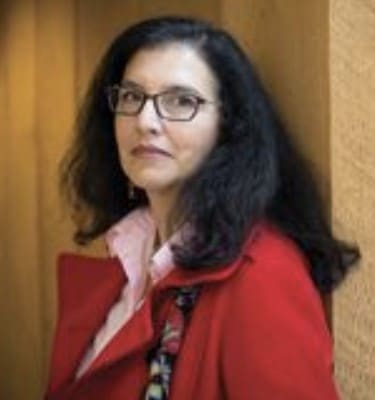EMERG ADVISORY COMMITTEE MEMBERS
Melania Alvarez, The University of British Columbia
Major Disciplines: Anthropology, Mathematics Education
Areas of Research: Teachers
Methods: Mixed Methods
Melania Alvarez de Adem is a Mexican mathematics educator who works as the Education Coordinator at the Pacific Institute for the Mathematical Sciences (PIMS), and Outreach Coordinator for the Department of Mathematics at the University of British Columbia in Vancouver. Alvarez grew up in Mexico City, where she completed her undergraduate education at the National Autonomous University of Mexico. She later earned master’s degrees in economics and anthropology from the University of Wisconsin–Madison and in operations research from Stanford University. In 2016 she completed a Ph.D. in mathematics education at Simon Fraser University. At UBC, Alvarez is known for the summer mathematics camps she developed to improve the mathematical education of indigenous secondary-school students. She is the 2012 winner of the Adrien Pouliot Award, given by the Canadian Mathematical Society for significant contributions to mathematics education in Canada. As well as her work with indigenous people, Alvarez has been active in organizing mathematics competitions, teacher workshops, and fundraising for mathematics education among the general population.
Deborah Ball, University of Michigan
Deborah Loewenberg Ball is the William H. Payne Collegiate Professor of education at the University of Michigan, an Arthur F. Thurnau Professor, a research professor in the Institute for Social Research, and the director of TeachingWorks. She taught elementary school for more than 15 years and continues to teach children every summer. Ball’s research focuses on the practice of teaching, using elementary mathematics as a critical context for investigating the challenges of helping children develop understanding and agency and to work collectively, and on leveraging the power of teaching to disrupt patterns of racism, marginalization, and inequity. Ball is an expert on the demands of teaching and the imperatives for teachers’ professional education.
Ball has authored more than 200 articles and chapters and has lectured and made major presentations around the world. She has also developed distinctive collections of video records of practice that are broadly used to make teaching practice visible. Her research has been recognized with several awards and honors, and she has served on national and international commissions and panels focused on the improvement of education. She currently serves on the National Science Board and the Mathematical Sciences Research Institute Board of Trustees and previously served as president of the American Educational Research Association (2017–2018) and as dean of the University of Michigan School of Education (2005–2016). Ball has been elected to the American Academy of Arts and Sciences and the National Academy of Education, and is a fellow of the American Mathematical Society and the American Educational Research Association.

Major Disciplines: Education Policy, Math Education, Teacher Education/Development
Areas of Research: Classroom Discourse, Primary School Education, Teaching/Pedagogical Studies
Methods: Qualitative, Discourse Analysis, Design-Based Research, Theory/Philosophy
Megan Bang, Northwestern University
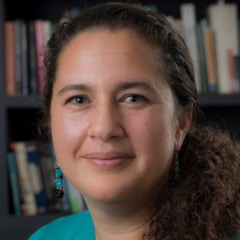
Major Disciplines: Cognition, Human Development, Learning Sciences, Psychology, Science Education
Areas of Research: Educational Equity, Elementary School Education, Informal/Out-of-School Learning, Multicultural Education & Diversity, Native American Students, Rural Students,
School/Community Partnerships, Urban Students
Methods: Quantitative, Qualitative, Discourse Analysis, Ethnography, Mixed Methods, Design-Based Research
Megan Bang (Ojibwe and Italian descent) is a Professor of the Learning Sciences and Director of the Center for Native American and Indigenous Research. Dr. Bang studies dynamics of culture, learning, and development broadly with a specific focus on the complexities of navigating multiple meaning systems in creating and implementing more effective and just learning environments in science, technology, engineering, arts, and mathematics education. She focuses on reasoning and decision-making about complex socio-ecological systems in ways that intersect with culture, power, and historicity. Central to this work are dimensions of identity, equity and community engagement. She works closely with Indigenous communities. She conducts research in both schools and informal settings across the life course. She has taught in and conducted research in teacher education as well as leadership preparation programs. She is former preschool teacher, middle-school and high-school teacher. Dr. Bang currently serves on the Board of Science Education at the National Academy of Sciences and is a member of the National Academy of Education. She is a mother, auntie, grandmother, sister, and daughter.
Richard Barwell, University of Ottawa
Richard Barwell is a Professor of Mathematics Education and Dean of the Faculty of Education at the University of Ottawa. He conducts research in critical mathematics education. Much of his research looks at the role of language and discourse in learning and teaching mathematics from the perspective of dialogicality. He is interested in how teachers use language in their teaching of mathematics and how students use language to think about mathematics, particularly in relation to diversity, equity and success for all. Dr. Barwell has investigated how second language learners or bilingual learners participate in school mathematics and how discourse practices are implicated in patterns of marginalization. He has also explored how mathematics education can address the global environmental crisis, and how discourses of mathematics contribute to exploitative human practices, again from the perspective of dialogicality. He believes there is no more urgent challenge.

Major Disciplines: Bilingual Education, Education, Linguistics, Mathematics Education, Qualitative Research Methods, Environmental/ Sustainability Education
Areas of Research: Bilingual/Multilingual Learners, Classroom Discourse, Equity and Diversity, Immigrants, Indigenous Students, Language, Learning, Literacy, Multicultural Education and Diversity, Primary School Education, Secondary School Education, Social Class/Stratification, Critical Mathematics Education, Climate Change Education
Methods: Qualitative, Discourse Analysis, Ethnography
Hyman Bass, University of Michigan

Major Disciplines: Education, Higher Education, Mathematics Education, Pedagogy, STEM Education, Teacher Education
Areas of Research: Ambitious Instruction, Learning, Postsecondary & Adult Education, School Reform, Secondary School Education, Knowledge for Teaching, Mathematical Cognition
Methods: Qualitative, Design-Based Research, Theory/Philosophy
Hyman Bass is the Samuel Eilenberg Distinguished University Professor of Mathematics and Mathematics Education at the University of Michigan. He came to Michigan from Columbia University in 1999. He has held many visiting appointments, extensively in India and in France. His mathematical work is in algebra, with connections to algebraic geometry, number theory, topology, and geometric group theory. His educational interests include mathematical knowledge for teaching, task design, mathematical practices, and the “mathematical horizons” of school mathematics. He is currently experimenting with instructional designs to help cultivate “connection oriented mathematical thinking.” This involves an in-depth study of mathematical structure, and concept formation. He is also developing an undergraduate course on mathematics and social justice Dr. Bass is a member of the National Academy of Sciences, the American Academy of Arts and Sciences, the Third World Academy of Sciences, and the National Academy of Education. He is past president of the American Mathematical Society and of the International Commission on Mathematical Instruction. He received the U. S. National Medal of Science in 2007.
Dan Battey, Rutgers University
Dan Battey is a Professor in Mathematics Education at the Graduate School of Education at Rutgers, the State University of New Jersey. He studies teaching that disrupts racism for African American and Latinx students in mathematics. Dr. Battey is currently using the lenses of teacher-student relationships and traditional mathematics logics to both counter whiteness and name antiracist mathematics instruction. His work has been published in the American Educational Research Journal, Harvard Educational Review, Teachers College Record, Educational Studies in Mathematics, Curriculum Inquiry, Urban Education, and Journal for Research in Mathematics Education, among others.
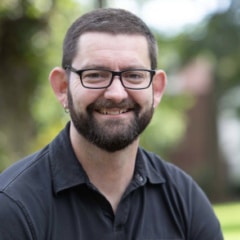
Major Disciplines: Education, Mathematics Education, Multicultural Education, Teacher Education
Areas of Research: Ambitious Instruction, Classroom Discourse, Equity and Diversity, Gender, Language, Primary School Education, Teachers, Race, Urban Students
Methods: Archival, Quantitative, Qualitative, Mixed Methods, Theory/Philosophy
Robert Berry III, The University of Arizona
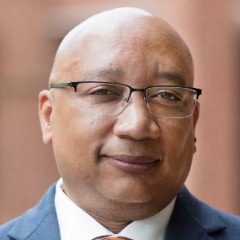
Major Disciplines: Education, Mathematics Education, Qualitative Research Methods, Teacher Education
Areas of Research: African-American Students, Identity, Teachers, Race
Methods: Qualitative, Ethnography
Robert Q. Berry III, Ph.D., is the Dean of the College of Education at the University of Arizona and is a Professor of Mathematics Education holding the Paul L. Lindsey and Kathy J. Alexander Chair. He is a National Academy of Education member and a Past-President of the National Council of Teachers of Mathematics. Berry has authored and co-edited eight books. Additionally, he has written more than 100 refereed and invited journal publications. His articles have appeared in the Journal for Research in Mathematics Education, the Journal of Teacher Education, Educational Studies in Mathematics, and the American Educational Research Journal. Berry has made over 300 academic presentations, keynote talks, distinguished lectures, and invited presentations worldwide and has received several significant awards for research and service. He is a first-generation college graduate who received his Bachelor of Science degree from Old Dominion University, his master’s degree from Christopher Newport University, and a Ph.D. from the University of North Carolina at Chapel Hill.
Mary Betsy Brenner, University of California, Santa Barbara
Mary Betsy Brenner is a professor emeritus in the Department of Education at the University of California where she worked from 1991 to 2021. She was department chair for 6 years and served as interim co-dean of the in 2015-16. Professor Brenner did her graduate work in Anthropology at UC Irvine. Her dissertation research looked at how the western type schools in Liberia incorporated and conflicted with the local culture in both teaching methods and mathematical topics. After completing her Ph.D., she worked at the Kamehameha Early Education Program in Hawaii. After Hawaii, Brenner taught in the SESAME program at UC Berkeley and continued her research in Liberia on the differences between modern and traditional forms of education. Since coming to UCSB in 1991, Brenner has been examining how mathematics can be taught more effectively for diverse groups of learners including English language learners, Native Alaskans, students in various Asian nations, and Micronesian students. She has also been working with several different after school programs to understand better how different kinds of learning environments can enhance student learning. In addition to her ongoing research work in Liberia, she has maintained a connection with the education system in the country by supporting an elementary school that began during the civil war, helping a number of students to attend high school and college and doing some professional development with teachers. Her primary teaching responsibilities were in the areas of qualitative methodology, educational anthropology, and mathematics education.
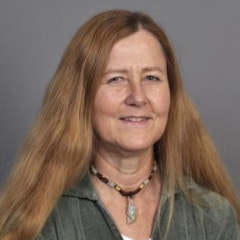
Major Disciplines: Anthropology, Education, Mathematics Education, Pedagogy, Qualitative Research Methods, Cognitive Science
Areas of Research: Bilingual/Multilingual Learners, Classroom Discourse, Equity and Diversity, Informal/Out-of-School Learning, Primary School Education, Secondary School Education, Teaching/Pedagogical Studies
Methods: Qualitative, Discourse Analysis, Ethnography
Angela Booker, University of California San Diego
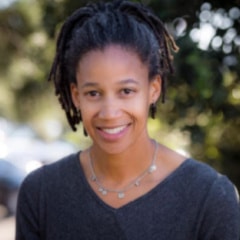
Major Disciplines: Cultural Studies, Education, Learning Sciences, Mathematics Education, Politics of Education, Qualitative Research Methods, Technology Studies
Areas of Research: Equity and Diversity, Identity, Informal/Out-of-School Learning, Learning, Middle School Education, Technology, Social Class/Stratification
Methods: Qualitative, Discourse Analysis, Ethnography, Design-Based Research
Angela Booker, Ph.D., Associate Professor in the Department of Communication at UC San Diego was appointed as the inaugural Provost of Eighth College, effective January 3, 2023.
Professor Booker has been a member of UC San Diego’s Communication faculty for the last 10 years. Her scholarly work explores the intersection between communication, learning, community engagement, social justice and undoing structural racism. She is co-editor of the book, “Power and Privilege in the Learning Sciences: Critical and Sociocultural Theories of Learning,” with Indigo Esmonde, and has published extensively on the topics of learning theory and technology, civic practice and engagement, and social change. She is an active, long-time member of the Democracy Lab in the Department of Communication and is also the co-director of the Black Studies Project.
In addition to her research and writing, Professor Booker has repeatedly demonstrated her teaching excellence and commitment to students. She has been the Director of Undergraduate Studies in the Department of Communication since 2021. An active member of the Thurgood Marshall College faculty, she has served on the executive committee and is the Faculty Director of the Public Service minor. She was selected for the Outstanding Faculty Award by the Black Resource Center and was a Hellman Fellow in 2014-15.
Through the many facets of her work, Professor Booker has demonstrated a deep commitment to student success and the vision of Eighth College and its theme of “Engagement and Community,” through which students can develop an understanding of their own identities’ vis á vis broader communities. Booker’s work in areas including access to math learning as a civil rights issue and her long-time partnership with the Town & Country Learning Center in Southeast San Diego, as well as her research and writing in the areas of social justice, community service and organizing for policy change, and the inclusion of young people in civic participation make her uniquely suited to leading UC San Diego’s newest college.
Travis Bristol, University of California, Berkeley
Travis J. Bristol is an associate professor of teacher education and education policy in Berkeley’s School of Education and (by courtesy) the Department of African American Studies. Using qualitative methods, Dr. Bristol explores three related research strands: (1) the role of educational policies in shaping teacher workplace experiences and retention; (2) district and school-based professional learning communities; (3) the role of race and gender in educational settings. Dr. Bristol’s research has appeared in over 60 peer-reviewed articles, book chapters, policy briefs, and opinion editorials including Urban Education, the American Educational Research Journal, Educational Evaluation and Policy Analysis, the Journal of Teacher Education, Teachers College Record, Harvard Educational Review, Brookings, and The Washington Post. He co-edited (with Conra Gist) The Handbook of Research on Teachers of Color and Indigenous Teachers, which was published by the American Educational Research Association (AERA). The National Academy of Education/Spencer Foundation, Ford Foundation, and AERA awarded Dr. Bristol dissertation fellowships in 2013. In 2016, he received the inaugural teacher diversity research award from the American Association of Colleges for Teacher Education. In 2019, Dr. Bristol received a Ford Foundation Postdoctoral Fellowship and an emerging scholar award from the Comparative and International Education Society, African Diaspora SIG. In 2020, he received a National Academy of Education/Spencer Postdoctoral Fellowship. In 2021, Dr. Bristol received the Early Career Award from AERA (Division-K). He is also the chair of the National Board for Professional Teaching Standards Board of Directors and chairs the California Department of Education Teacher Diversity Advisory Group.
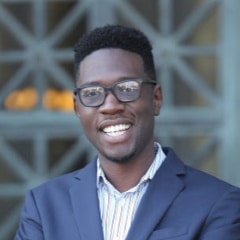
Major Disciplines: Education, Policy Studies, Qualitative Research Methods, Teacher Education,
Areas of Research: Achievement, African-American Students, Equity and Diversity, Organizational Theory, Teachers, Race, School Reform, Secondary School Education, Urban Students
Methods: Qualitative
Kyndall Brown, California Mathematics Project (Executive Board Member)

Major Disciplines: Mathematics Education
Areas of Research: African-American Students, Equity and Diversity, Middle School Education, Race, School/Community Partnerships, Secondary School Education, Urban Students
Methods: Quantitative, Qualitative, Mixed Methods
Kyndall Brown has over 35 years of experience in mathematics education. Kyndall holds a bachelor’s degree in mathematics, master’s degrees in computer-based education and mathematics education, and a Ph.D in Education. He was a secondary mathematics teacher for 13 years. He has been a professional development provider for schools and districts in Los Angeles County for over 25 years. He is currently the executive director of the California Mathematics Project. He presents at local, state, and national conferences on mathematics education. He writes articles for mathematics education publications. His research focuses on the impact of culture and identity on the ways that African-American males learn mathematics. He is the co-author of the book Choosing To See: A Framework For Equity In The Math Classroom.
Erika Bullock, University of Wisconsin-Madison
Dr. Erika C. Bullock is Associate Professor in the School of Education at the University of Wisconsin-Madison. She is a member of the Holtz Center for Science and Technology Studies and an affiliate faculty member in the Department of Afro-American Studies. Dr. Bullock’s work spans curriculum studies, urban education, mathematics education and STEM education. As a transdisciplinary scholar, she uses theories from urban sociology, cultural studies, literary theory, and science and technology studies to examine how issues and ideologies within mathematics and STEM education grow out of historical precedents and to examine how power operates within these disciplines to create and maintain racial inequities. Dr. Bullock is a 2017 National Academy of Education/Spencer Foundation postdoctoral fellow and 2019-20 Nellie McKay Postdoctoral Fellow. She was awarded the 2017 Taylor and Francis Publication Best Paper Award from the American Educational Research Association and the 2021 Early Career Publication Award for the American Educational Research Association’s Special Interest Group on Research in Mathematics Education. She is also a fellow in the University of Wisconsin-Madison Teaching Academy, an honor bestowed upon faculty with consistent demonstrated excellence in teaching. Dr. Bullock presently serves as Secretary-Elect of Division B (Curriculum Studies) of the American Educational Research Association. She earned her B.S. in Computer Science from Spelman College and her M.Ed. and Ph.D. in Mathematics Education from Georgia State University.
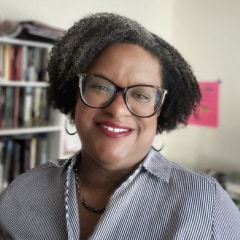
Major Disciplines: Cultural Studies, Education, Mathematics Education, Multicultural Education, Pedagogy, Philosophy, Politics of Education, Qualitative Research Methods, STEM Education, Technology Studies, Women’s Studies
Areas of Research: African-American Students, Equity and Diversity, Gender, Multicultural Education and Diversity, Race, School Reform, Urban Students, History of Mathematics Education, Curriculum Studies
Methods: Archival, Qualitative, Legal/Policy Analysis, Theory/Philosophy
Sylvia Celedón-Pattichis, The University of Texas at Austin
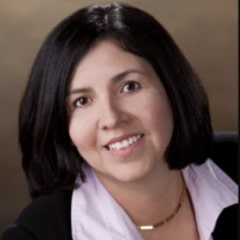
Major Disciplines: Bilingual Education, Education, Mathematics Education, Qualitative Research Methods, STEM Education, Teacher Education
Areas of Research: Bilingual/Multilingual Learners, Classroom Discourse, Equity and Diversity, Immigrants, Informal/Out-of-School Learning, Language, Latine Students, Middle School Education, Teachers, Technology, School/Community Partnerships, Teaching/Pedagogical Studies, Integration of Mathematics and Computer Programming
Methods: Archival, Qualitative, Discourse Analysis, Case Study
Sylvia Celedón-Pattichis is Professor of Bilingual/Bicultural Education in the Department of Curriculum and Instruction at the University of Texas at Austin. She recently served as Senior Associate Dean for Research and Community Engagement and Director of the Center for Collaborative Research and Community Engagement in the College of Education and Human Sciences at the University of New Mexico. Her research interests focus on studying linguistic and cultural influences on the teaching and learning of mathematics, particularly with Spanish-English bilingual students. She has led several funded projects that focus on turning language and culture into educational assets in teaching and learning mathematics. Currently, she collaborates in interdisciplinary projects to integrate mathematics and computing in bilingual middle schools. She serves as a National Advisory Board Member of several NSF-funded projects and as an Editorial Board Member of the Bilingual Research Journal, Journal of Latinos and Education, and Teachers College Record. Her current work is a special issue on Teaching and Learning Mathematics and Computing in Multilingual Contexts through Teachers College Record. She co-edited three books published by the National Council of Teachers of Mathematics titled Access and Equity: Promoting High Quality Mathematics in Grades PreK-2 and Grades 3-5 and Beyond Good Teaching: Advancing Mathematics Education for ELLs. Dr. Celedón-Pattichis was a recipient of the Innovation in Research on Diversity in Teacher Education Award from the American Educational Research Association and the 2011 Senior Scholar Reviewer Award from the National Association of Bilingual Education. She was also a recipient of the Regents Lectureship Award, the Faculty of Color Research Award, Chester C. Travelstead Endowed Faculty Award, and the Faculty of Color Mentoring Award to recognize her research, teaching, and service at the University of New Mexico. The accomplishments she is most proud of are her two daughters, Rebecca and Antonia Pattichis.
Theodore Chao, The Ohio State University
Theodore Chao (he/him/his) is an Associate Professor of Mathematics Education at The Ohio State University in Columbus, Ohio. Professor Chao uses video, photovoice, and technology to engage children, teachers, and community members in telling and sharing their mathematics stories so we can all recognize our mathematical power. First, he actively works to help remove our blinders about what mathematics is and how it is taught, helping teachers and students see that another way of knowing and understanding mathematics is possible beyond their own school experiences. Second, he believes in collecting multiple opportunities for connection, delving into the ways all our mathematics stories and lives intersect with each other. Third, his scholarship and teaching revolve around radical love, the belief that the only path to freedom is through the very hard and necessary step of loving each other and ourselves. Fourth, he sees competition, especially in mathematics learning, as problematic, stealing opportunities for joy that come from collaborative mathematical thinking. These core values guide Professor Chao’s scholarship, teaching, and service towards a humanizing, loving, and decolonizing vision of mathematics and STEM Education.

Major Disciplines: Mathematics Education, Qualitative Research Methods, STEM Education, Teacher Education
Areas of Research: Asian Students, Early Childhood Education, Equity and Diversity, Identity, Informal/Out-of-School Learning, Multicultural Education and Diversity, Teachers, Technology, Race, School Reform, School/Community Partnerships, Urban Students, Storytelling
Methods: Qualitative, Design-Based Research
Marta Civil, The University of Arizona
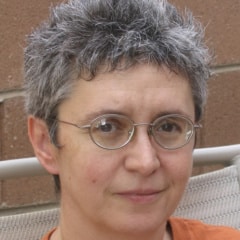
Major Disciplines: Bilingual Education, Mathematics Education, Multicultural Education, Qualitative Research Methods, Teacher Education, Family/Community Engagement in Mathematics
Areas of Research: Bilingual/Multilingual Learners, Equity and Diversity, Immigrants, Informal/Out-of-School Learning, Latine Students, Multicultural Education and Diversity, Postsecondary & Adult Education, Primary School Education, Teachers, School/Community Partnerships, Secondary School Education
Methods: Archival, Qualitative
Marta Civil is a Professor and the Roy F. Graesser Chair in the Department of Mathematics at The University of Arizona. She is also a University Distinguished Outreach Professor Her research looks at cultural, social, and language aspects in the teaching and learning of mathematics; participation in the mathematics classroom; connections between in-school and out-of-school mathematics; and parental engagement in mathematics. Her work is grounded on the concepts of funds of knowledge and parents as intellectual resources, with a focus on developing culturally sustaining learning environments in mathematics education. She has led multiple funded projects working with children, parents, and teachers, primarily in Mexican American communities. Three former projects are: NSF-funded MAPPS (Math and Parent Partnerships in the Southwest) to promote Latina/o parental engagement in mathematics; NSF-funded CEMELA (Center for the Mathematics Education of Latinos/as), a multi-university consortium focused on research and practice on the connections between the teaching and learning of mathematics and the cultural, social, and linguistic contexts of Latina/o students; and a preK-3 parental engagement mathematics project aimed at developing a two-way dialogue between home and school, funded by Heising-Simons. Her current work includes a collaboration with two other universities focused on the development of a mathematical partnership that engages teachers, parents, and multilingual children in grades 2-5 in underserved communities. She is also exploring how to apply lessons learned from her work in equity in K-12 settings to entry level college mathematics teaching and learning. She received the TODOS Iris M. Carl Equity and Leadership Award in 2013 and the NCTM Lifetime Achievement Award in 2021. She became an AERA Fellow in 2023.
Lawrence Clark, The University of Maryland
Lawrence M. Clark is an Associate Dean in the Office of Undergraduate Studies and Associate Professor of Mathematics Education at the University of Maryland Center for Mathematics Education. He obtained his bachelor’s degree in mathematics from Hampton University, and M.Ed. and Ph.D. degrees from Emory University. Prior to joining the Maryland faculty, Dr. Clark was a postdoctoral research fellow at the Center for Proficiency in Teaching Mathematics at the University of Michigan. Prior to his appointment at the University of Michigan, Dr. Clark served as the National Director of Mathematics for Project GRAD USA, a national school reform initiative in several urban school districts. Dr. Clark is currently Principal Investigator for an NSF-funded project focused on exploring and supporting adolescents’ interest in mathematics and statistics through immersion in sports data analytics. Dr. Clark has served in multiple leadership roles at the departmental, college, and campus level, and participates in national organizations focused on the advancement of mathematics education. Dr. Clark has experience as a mathematics teacher educator in the U.S., Ethiopia, Ecuador, and Kenya. From 1992 – 2000, Dr. Clark taught middle school mathematics in Atlanta, GA. Dr. Clark’s research interests focus on examining and exploring relationships between teachers’ knowledge, beliefs, and dispositions and their instructional practices. An additional research focus is mapping and supporting adolescents’ mathematics identity formation.
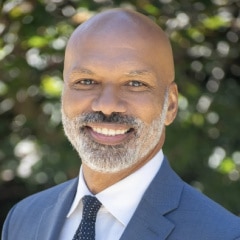
Major Disciplines: Higher Education, Mathematics Education, STEM Education, Teacher Education
Areas of Research: Identity, Informal/Out-of-School Learning, Postsecondary & Adult Education, Teachers, Secondary School Education
Methods: Quantitative, Qualitative
Cindy Cruz, The University of Arizona
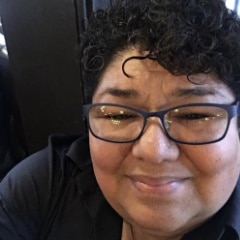
Major Disciplines: Anthropology, Education, Ethnic Studies, Pedagogy, Qualitative Research Methods, Women’s Studies, LGBTQ Studies in Education
Areas of Research: Informal/Out-of-School Learning, Latine Students, Race, Secondary School Education, Urban Students, Queer and Trans Youth, Houselessness, Poverty
Methods: Qualitative, Ethnography
Cindy Cruz is an associate professor in the Teaching, Learning and Sociocultural Studies Department in the College of Education at the University of Arizona and a member of the editorial collective of Frontiers: A Journal of Women’s Studies. She received her Ph.D. from UCLA, was a postdoctoral fellow at Cornell University, and faculty at UC Santa Cruz. Her research centers the narratives of houseless queer and trans*youth in Los Angeles, California. Her theoretical foundations center the work of U.S. feminists of color and Latinx and decolonial feminist theory. In a previous life, she was a high school English teacher and HIV counselor and this experience greatly influences her research and pedagogy. Her current projects include gentrification, mobility, surveillance, and the use of geo-spatial applications amongst houseless youth. She is also concerned with the pedagogy of feminist writing, resistance research and ethnography. Dr. Cruz has been honored with several academic prizes, including the Antonia I. Castañeda Prize, the Golden Apple for Teaching Excellence, AERA’s Queer Studies in Education Article of the Year, and AERA’s Queer Studies in Education Body of Work Award.
Linda Darling-Hammond, Learning Policy Institute
Linda Darling-Hammond is the President and CEO of the Learning Policy Institute. She is also the Charles E. Ducommun Professor of Education Emeritus at Stanford University where she founded the Stanford Center for Opportunity Policy in Education and served as the faculty sponsor of the Stanford Teacher Education Program, which she helped to redesign.
Darling-Hammond is past president of the American Educational Research Association and recipient of its awards for Distinguished Contributions to Research, Lifetime Achievement, and Research-to-Policy. She is also a member of the American Association of Arts and Sciences and of the National Academy of Education. From 1994–2001, she was executive director of the National Commission on Teaching and America’s Future, whose 1996 report What Matters Most: Teaching for America’s Future was named one of the most influential reports affecting U.S. education in that decade. In 2006, Darling-Hammond was named one of the nation’s ten most influential people affecting educational policy. She led the Obama education policy transition team in 2008 and the Biden education transition team in 2020. In 2022, Darling-Hammond received the Yidan Prize for Education Research in recognition of her work that has shaped education policy and practice around the most equitable and effective ways to teach and learn.
Darling-Hammond began her career as a public school teacher and co-founded both a preschool and a public high school. She served as Director of the RAND Corporation’s education program and as an endowed professor at Columbia University, Teachers College. She has consulted widely with federal, state and local officials and educators on strategies for improving education policies and practices. Among her more than 500 publications are a number of award-winning books, including The Right to Learn, Teaching as the Learning Profession, Preparing Teachers for a Changing World, and The Flat World and Education. She received an Ed.D. from Temple University (with highest distinction) and a B.A. from Yale University (magna cum laude).
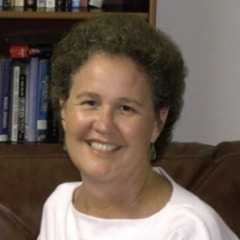
Major Disciplines: Education, Educational Leadership, Human Development, Learning Sciences, Pedagogy, Policy Studies, Teacher Education
Areas of Research: Achievement, African-American Students, Education Finance, Learning, Teachers, Race, School Reform, School/Community Partnerships, Secondary School Education, Social and Emotional Learning, Teaching/Pedagogical Studies
Methods: Quantitative, Qualitative, Mixed Methods, Legal/Policy Analysis
Frank Davis, Frank E. Davis Consulting
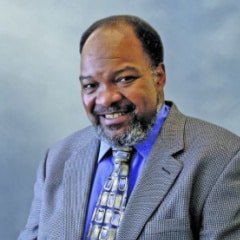
Major Disciplines: Behavioral Sciences, Education, Educational Leadership, Human Development, Learning Sciences, Mathematics Education, Pedagogy, Philosophy, Politics of Education, Science Education, Statistics/Measurement/Research Methods, STEM Education, Teacher Education, Technology Studies, Evaluation
Areas of Research: Achievement, African-American Students, Equity and Diversity, Identity, Informal/Out-of-School Learning, Learning, Middle School Education, Teachers, Technology, Race, School Reform, School-to-Postsecondary Education Transitions, School/Community Partnerships, Teaching/Pedagogical Studies, Urban Students, Evaluation Studies
Methods: Quantitative, Mixed Methods, Design-Based Research, Theory/Philosophy, Program Evaluation
Dr. Frank E. Davis currently works as a consultant focusing on research and evaluation of the STEM education of African American students. He was President of TERC (2007-2014), a Cambridge, MA based nonprofit organization nationally recognized for research and development work in science and mathematics education, and the use of technology in education. He came to TERC from Lesley University in Cambridge, MA (1985 -2007) where he was a Professor, Director of the Ph.D. Interdisciplinary Program in Educational Studies and a Senior Research Associate in the Program Evaluation and Research Group (PERG). Among many PERG projects, he carried out evaluation and research on the work of the Algebra Project, founded by Robert Moses, also known for his 60s voting rights work in Mississippi. Since the 80s, the Algebra Project has focused primarily on the mathematics education of African American students in poor and segregated communities across the country, addressing the teaching, learning and assessment of mathematics, and the policies of schools, school districts, the state and nation that produce racial and other inequities in learning opportunities. Frank’s educational background includes a BA in Physics (Franklin & Marshall College), an MS in Physics (University of Massachusetts/Amherst) and an EdD in Teaching and Learning Environments (Harvard Graduate School of Education). He has been a Visiting Scholar at Stanford University, a Research Fellow at the National Science Foundation and a recipient of a Danforth Graduate Fellowship for study at Harvard University.
Zandra de Araujo, University of Florida
Zandra de Araujo serves as the Chief Equity Officer and mathematics principal at the Lastinger Center for Learning. Her research examines teachers’ instruction in algebra with students who are primarily English learners. She has been Principal Investigator (PI) or co-PI on several grants funded by the National Science Foundation, and her work has been published in numerous top tier journals. Zandra began her career as a high school math teacher for Orange County Public Schools. After earning her doctorate, she has served as a board member of prominent professional organizations including TODOS: Mathematics for All, and the National Council of Teachers of Mathematics. She has been an invited speaker at several math teacher organizations and has received numerous awards for her work including the University of Missouri’s 2019 President’s Award for Early Career Excellence and the 2020 Early Career Award for the Association of Mathematics Teacher Educators. She earned a Bachelor of Science in Mathematics from the University of Florida, and her Master of Education in Mathematics Education from the University of Central Florida. In 2008, Zandra began her doctoral program in mathematics education at the University of Georgia. Upon completing her Ph.D. in 2012, she joined the faculty at the University of Missouri and was an associate professor of mathematics education there until joining the Lastinger Center in September 2021.
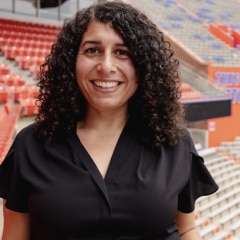
Major Disciplines: Bilingual Education, Education, Mathematics Education, Qualitative Research Methods, STEM Education, Teacher Education
Areas of Research: Bilingual/Multilingual Learners, Classroom Discourse, Equity and Diversity, Latine Students, Learning, Middle School Education, Multicultural Education and Diversity, Secondary School Education, Community College (Mathematics)
Methods: Qualitative, Discourse Analysis, Ethnography
Edward Doolittle, First Nations University of Canada
Edward Doolittle is Kanyen’kehake (Flint Nation, Mohawk) from Six Nations in southern Ontario. He earned a PhD in pure mathematics (partial differential equations) from the University of Toronto in 1997. He is currently Associate Professor of Mathematics at First Nations University of Canada in Regina, Saskatchewan. His research is on Indigenous mathematics, Indigenizing mathematics, Indigenous mathematics education, and applications of mathematics to areas of interest to Indigenous people.
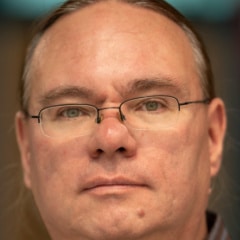
Major Disciplines: Mathematics Education, STEM Education
Areas of Research: Indigenous Students, Multicultural Education and Diversity
Methods: Ethnography, Mixed Methods, Theory/Philosophy
Traci English-Clarke
Dr. Traci English-Clarke is an independent consultant and researcher whose work encompasses both education-related evaluation research and STEAM curriculum development. In both areas, she focuses on issues of socialization and identity and aims to increase equity around access to quality mathematical and STEM experiences. Her research has focused on the racial, mathematical, racial-mathematical, and science socialization and identity of students of color in middle school, high school, and college. She has worked both independently and with Creative Research & Evaluation to conduct qualitative and mixed-method evaluation research that helps STEM-focused equity initiatives to ensure that their programs are having the desired positive impact on students of color and on specific STEM fields. Her curriculum development work has primarily focused on youth in grades K-8, although she is currently working with an organization to develop out-of-school mathematical experiences for youth in grades Pre-K-3. She has developed math and science curriculum for out-of-school programs through Say Yes to Education’s Philadelphia Freedom School and the UPenn CDF Freedom School. For ThinkLive! in collaboration with researchers at the University of Chicago, she led a team of curriculum developers (including herself) in creating a culturally relevant curriculum for after-school programs aimed at middle school and high school youth that created a bridge between Djing/turntablism and STEAM concepts. Dr. English-Clarke earned her Ph.D. in Teaching, Learning, and Curriculum, with a focus on math education from the University of Pennsylvania. She earned her B.A. in Sociology from Harvard University.
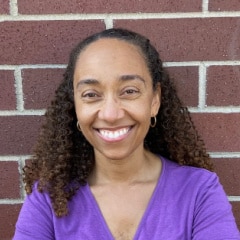
Major Disciplines: Mathematics Education, STEM Education
Areas of Research: African American Students, Identity, Race, Urban Students, Equity and Diversity, Informal/Out of School Learning, Middle School Students, Early Childhood Education
Methods: Quantitative, Qualitative, Mixed Methods
Henry Fowler, Navajo Math Circles
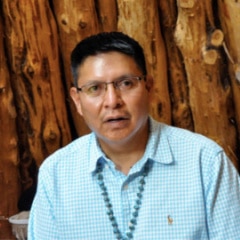
Major Disciplines: Education, Mathematics Education, Multicultural Education, Teacher Education
Areas of Research: Bilingual/Multilingual Learners, Indigenous Students, Learning, Literacy, Multicultural Education and Diversity, Native American Students, Secondary School Education, Teaching/Pedagogical Studies
Methods: Mixed Methods
Dr. Henry Fowler is the co-founder of the Navajo Math Circles. The Navajo Math Circles provides teacher workshops for grades K–12 and works with over 40 mathematicians to promote math education for students of the Navajo Nation. His research interests lie in Ethnomathematics. Mr. Fowler’s passion is for promoting math literacy and advocating for social justice through mathematics. He strongly supports relevant cultural materials that guide instruction.
Megan Franke, University of California, Los Angeles
Megan Franke is a Professor of Education at UCLA. Dr. Franke’s research focuses on understanding and supporting student and teacher learning. She studies how teachers make use of research-based information about the development of children’s mathematical thinking to support students to learn mathematics. She is particularly interested in how teaching mathematics with attention to students’ mathematical thinking (CGI) can challenge existing school structures and support students who are often marginalized to be seen as productive participants with rich mathematical understanding. She has been engaged in a series of studies with her colleagues that link classroom practice and student outcomes in elementary mathematics classrooms. She is currently partnering with LAUSD to support preschool and elementary teachers and principals in 230 schools as they reconsider the teaching and learning of mathematics. Her research work to support teachers, schools and communities was recognized with the AERA Research into Practice Award.
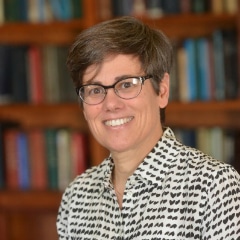
Major Disciplines: Education, Mathematics Education, Teacher Education
Areas of Research: Classroom Discourse, Early Childhood Education, Identity, Learning, Primary School Education, Teachers, School/Community Partnerships, Teaching/Pedagogical Studies
Methods: Quantitative, Qualitative, Mixed Methods
Maisie Gholson, University of Michigan
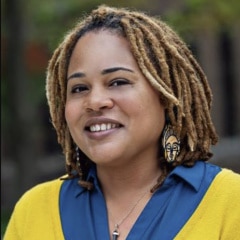
Major Disciplines: Education, Learning Sciences, Mathematics Education, Qualitative Research Methods, Women’s Studies, Childhood Studies
Areas of Research: African-American Students, Equity and Diversity, Gender, Identity, Learning, Race
Methods: Qualitative, Ethnography
Within a Black feminist framework, Maisie Gholson’s research seeks to understand how our identities and relational ties to mathematics, peers, and teachers create different developmental trajectories and learning opportunities within mathematics contexts. She actively investigates that which is often dismissed as superfluous to mathematics—children’s social relationships and networks. A driving force in her research is to foreground children’s and adolescents’ humanity, i.e., to take seriously the constructed racialized and gendered backdrop of childhood and adolescence as a visceral context in the process of mathematics identity development. As such, Maisie deals explicitly with issues of race and gender, along with the theoretical and methodological challenges that these complex constructs entail.
Her methodological interests have also led to her investigation of the relational work involved in critical mathematics teaching, as well as how the narrative constructions of White womanhood mediate young, White pre-service teachers’ development as justice-oriented instructors.
Maisie is a former high school mathematics teacher and prior to that a patent writer in her hometown of Houston, Texas. She is a UM NCID member, STaR Fellow, and a recipient of the National Academy of Education/Spencer Dissertation Fellowship, the National Science Foundation Graduate Research Fellowship in STEM Education, and UIC Graduate College Abraham Lincoln Fellowship. She received her PhD in curriculum and instruction from the University of Illinois at Chicago (UIC) and her BS in electrical engineering from Duke University.
Melissa Gresalfi, Vanderbilt University
Melissa Gresalfi is a professor of Mathematics Education and the Learning Sciences, and Dean of Residential Colleges and Residential Education at Vanderbilt University. Her research considers how to design learning environments that support students’ empowered engagement with mathematics. Her projects explore how tasks, social interactions, norms, and broader narratives support student learning and identity. These projects share a commitment to understand how classroom structures and curricular designs create (or limit) opportunities for students to engage meaningfully with information. Her research is published in journals such as Educational Studies in Mathematics, the Journal for Research in Mathematics Education, The Journal of the Learning Sciences, and Computers and Education. She has served as Associate Editor of the American Educational Research Journal and the Journal of the Learning Sciences. She was awarded the Jan Hawkins Early Career award by Division C of the American Educational Research Association, and was a postdoctoral fellow for the National Academy of Education. Gresalfi has served as PI or co-PI on numerous grants funded through the Gates Foundation, the Institute of Education Sciences, the MacArthur Foundation, the National Science Foundation, and the Spencer Foundation. She received her B.A. from Franklin and Marshall College in Psychology and French, and her M.A. in Education and PhD in Educational Psychology from Stanford University.

Major Disciplines: Education, Higher Education, Learning Sciences, Mathematics Education, Pedagogy, Qualitative Research Methods, STEM Education, Teacher Education, Technology Studies
Areas of Research: Ambitious Instruction, Classroom Discourse, Early Childhood Education, Equity and Diversity, Identity, Informal/Out-of-School Learning, Learning, Middle School Education, Postsecondary & Adult Education, Teachers, Technology, Race, School Reform, Social and Emotional Learning, Teaching/Pedagogical Studies, Urban Students, White Students, Primary School Education, Teachers, School/Community Partnerships, Teaching/Pedagogical Studies
Methods: Quantitative, Discourse Analysis, Ethnography, Design-Based Research
Kris Gutiérrez, University of California, Berkeley

Kris D. Gutiérrez is the Carol Liu Distinguished Professor and former Associate Dean at the Berkeley School of Education, University of California, Berkeley. Gutiérrez’s expertise is in the learning sciences, literacy, policy, and qualitative and design-based approaches to inquiry. Gutiérrez is an elected member of the National Academy of Education, the American Academy of Arts and Sciences and a Fellow of the British Academy; she is an ISLS and AERA Fellow, an Osher Fellow of the Exploratorium, as well as of the Center for Advanced Study in the Behavioral Sciences. She serves on the ISLS Executive Committee and Board and is past president of the American Educational Research Association and vice-chair of the National Board for the Institute of Education Sciences. Gutiérrez’s research examines learning in designed environments, with attention to culture, historicity, and ecological resilience, and the affordances of syncretic approaches to literacy and STEM learning with immigrant and translingual student populations. Her work in social design-based experiments foregrounds issues of equity in learning and design (Equity by Design). Gutiérrez’s research has published widely on learning in premier academic journals and is a co- author of Learning and Expanding With Activity Theory. Gutiérrez has won numerous awards: the AERA Division C Sylvia Scribner Award for influencing the field of learning and instruction, the 2016 Oscar Causey award for influencing the field of literacy, the 2014 Distinguished Contributions to Social Contexts in Education Research – Lifetime Achievement Award and the 2014 Trueba Award for Research Leading to the Transformation of the Social Contexts of Education Division G, AERA), the 2005 AERA Division C Sylvia Scribner Award for influencing the field of learning and instruction, the 2016 Medal of Excellence from the Columbia University/Teachers College, and the Spencer Foundation Mentorship award, and the UCLA Distinguished Teaching Award, for example. Gutiérrez received the AERA Hispanic Research in Elementary, Secondary, or Postsecondary Education Award and the Inaugural Award for Innovations in Research on Diversity in Teacher Education, Division K (AERA). Her empirical studies are funded by the Spencer Foundation, NSF, the Sloan, and the MacArthur Foundation (Connected Learning Research Network). Key examples of longstanding collaborations with immigrant and migrant communities include Las Redes, a 15-year long after-school afterschool program that privileged hybrid language practices for youth, grades K-5, El Pueblo Mágico, a STEM-oriented after-school program, and the UCLA Migrant Student Leadership Program for California youth from migrant farmworker backgrounds.
Gutiérrez served on the National Research Council Committee on Strengthening Science Education through a Teacher Learning Continuum and on the Guiding the Implementation of PreK-12 Engineering Education Committee, National Academy of Engineering. Her empirical studies are funded by Spencer, NSF, the Sloane Foundation, and the MacArthur Foundation as co-pi on the MacArthur Funded Connected Learning Research Network. She served on the U.S. Department of Education Reading First Advisory Committee and was a member of President Obama’s Education Policy Transition Team.
Rochelle Gutiérrez, University of Illinois Urbana-Champaign
Gutiérrez (Xicana/Rarámuri) grew up on Ohlone lands (California Bay) in an activist family, where she learned the value of organizing from her father who was an electrician and the art of creative insubordination from her mother who advocates for farmworkers, undocumented people, and students in community colleges. Gutiérrez runs the Political Conocimiento Development Tools Lab at the University of Illinois, where she supports teachers to deconstruct the politics in teaching/mathematics and to use creative insubordination to rehumanize mathematics/science. She has been an active member of Society for the Advancement of Chicanos and Native Americans in Science (SACNAS) and Science for the People; helped build the Program (now Department) of Latina/Latino Studies and the Center for Indigenous Science in the Carl R. Woese Institute for Genomic Biology; served on the national writing team for the AMTE Standards for Preparing Teachers of Mathematics; and offers professional development on activism and rehumanizing STEM for mathematicians/scientists (e.g., Park City Mathematics Institute). Before and throughout graduate school she taught mathematics to adolescents attending Title 1 schools. For the past 30 years, she has been deeply and passionately invested in supporting teachers to teach meaningful and culturally relevant mathematics and to advocate for justice. Her work on Rehumanizing Mathematics and creative insubordination has been used in school districts and university mathematics/science departments in the US and internationally. In seeking to broaden ethnomathematics, she developed the concept Living Mathematx and has argued for a spiritual turn in mathematics education research, which relies on Indigenous perspectives and futures.

Major Disciplines: Behavioral Sciences, Cultural Studies, Education, Ethnic Studies, Higher Education,Mathematics Education, Pedagogy, Philosophy, Policy Studies, Politics of Education, Qualitative Research Methods, Science Education, STEM Education, Teacher Education
Areas of Research: Achievement, African-American Students, Bilingual/Multilingual Learners, Classroom Discourse, Equity and Diversity, Gender, Identity, Immigrants, Indigenous Students, Informal/Out-of-School Learning, Learning, Latine Students, Middle School Education, Native American Students, Teachers, Race, School/Community Partnerships, Secondary School Education, Social Class/Stratification, Teaching/Pedagogical Studies, Urban Students, Indigenous Education, Political Knowledge in Teaching, Nature of Mathematics
Methods: Qualitative, Discourse Analysis, Ethnography, Design-Based Research, Theory/Philosophy, YPAR
Leslie Herrenkohl, University of Michigan
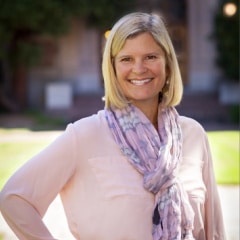
Major Disciplines: Education, Human Development, Learning Sciences, Pedagogy, Psychology, Qualitative Research Methods, Science Education, STEM Education
Areas of Research: Classroom Discourse, Equity and Diversity, Identity, Immigrants, Informal/Out-of-School Learning, Learning, Postsecondary & Adult Education, Race, School/Community Partnerships, Social and Emotional Learning, Urban Students
Methods: Qualitative, Discourse Analysis, Ethnography, Mixed Methods, Design-Based Research, Theory/Philosophy
Leslie Rupert Herrenkohl, Ph.D. is a Professor of Educational Studies at the University of Michigan. She is also a faculty member in the Combined Program in Education and Psychology. She is a developmental psychologist and learning scientist who is fascinated by how people learn. She brings a holistic, critical sociocultural approach to examining how people learn concepts, develop practices, and transform their participation in activities that matter to them. Dr. Herrenkohl’s current research focuses on human learning and pedagogical practice inside and outside of school, particularly in science related learning contexts.
As a designer of learning environments, Dr. Herrenkohl supports powerful learning that is conceptually rich, personally meaningful, and culturally relevant and sustaining. She creates learning environments inside and outside of school settings and then studies how people learn within them. In order to do this work, she partners with practitioners. These collaborations give her a deep appreciation for the need to integrate theory and practice and to conduct iterative research to better understand the impact of particular approaches and strategies.
A current research project undertaken in the context of STUDIO (with colleagues Drs. Calabrese Barton & Davis) is a one-year study to document how youths, educators, and mentors learn the science of COVID-19 in real time. This includes how people activate their scientific knowledge towards informed decision making, how these processes change over time, and how this is shaped by equity concerns and contextual factors alongside other forms of knowledge. This project is funded by the National Science Foundation.
Herrenkohl serves on the editorial board for the American Educational Research Journal, Cognition & Instruction, and Science Education. Her publications appear in Educational Researcher, Cognition & Instruction, the Journal of the Learning Sciences, Science Education, and Teachers College Record, among other outlets. She received her M.A. (1991) and Ph.D. (1995) in psychology from Clark University.
Ilana Horn, Vanderbilt University
Dr. Horn’s work is motivated by the underperformance of American secondary students in school mathematics. Her research centers on ways to make authentic mathematics accessible to students, particularly those who have historically been disenfranchised by our educational system. She focuses primarily on mathematics teaching in two ways. First, she look at classroom practices that engage the most students in high quality mathematics. Second, viewing teaching as a situated practice, she is interested in how school environments, communities, colleagues, and policies shape what is instructionally possible. Her scholarship lies at the intersection of mathematics education, learning sciences, and sociology of teachers’ work.
Her research projects have spanned questions of in-service teachers’ professional learning, pre-service education, district level instructional improvement, and students’ experiences of different forms of mathematics instruction. These projects implicate the way teachers’ work is organized in supporting the best forms of instruction for students. Theoretically, she draws on ethnomethodology and sociocultural studies of learning. Methodologically, Dr. Horn conducts comparative case studies with discourse analysis as a tool to understand local meanings.
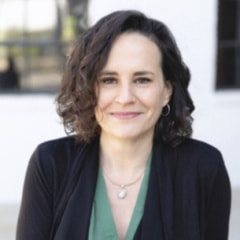
Major Disciplines: Mathematics Education, Qualitative Research Methods, Teacher Education
Areas of Research: Equity and Diversity, Informal/Out-of-School Learning, Teachers, Secondary School Education, Teaching/Pedagogical Studies
Methods: Qualitative, Discourse Analysis, Ethnography, Mixed Methods, Comparative, Design-Based Research
Kara Jackson, University of Washington
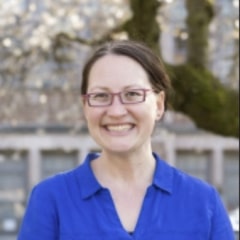
Major Disciplines: Education, Mathematics Education, Pedagogy, Qualitative Research Methods, Teacher Education
Areas of Research: Ambitious Instruction, Equity and Diversity, Learning, Middle School Education, Teachers, School/Community Partnerships
Methods: Qualitative, Ethnography, Design-Based Research
Kara Jackson is an associate professor of mathematics education at the University of Washington, Seattle. Jackson’s research focuses on (1) elaborating critical distinctions in secondary mathematics teachers’ perspectives and practices that matter for advancing equity, and (2) investigating and supporting schools and districts to design and implement coherent systems of support that enable teachers to develop ambitious and equitable teaching. Jackson’s scholarship and practice is grounded in long-term partnerships with teachers, coaches, and leaders in schools and districts. Her research has been supported by a National Academy of Education/Spencer Postdoctoral Fellowship, the Spencer Foundation, the National Science Foundation, and the Carnegie Foundation for the Advancement of Teaching. She completed her doctorate in Education, Culture, and Society with an emphasis in mathematics education at the University of Pennsylvania, and her bachelor’s degree in mathematics at Bates College. Jackson taught secondary mathematics in Vanuatu as a Peace Corps volunteer and was a mathematics specialist, supporting both youth and their families, for the Say Yes to Education Foundation in Philadelphia.
Christopher Jett, Georgia State University
Christopher C. Jett is an associate professor of mathematics education in the Department of Middle and Secondary Education. His research examines Black male students’ mathematical and racialized experiences drawing upon race-based and culturally relevant frameworks. His work has been funded by the National Science Foundation, New Venture Fund and the U.S. Department of Education.
Jett’s awards include an NSF CAREER award, the 2019 Association of Mathematics Teacher Educators (AMTE) Early Career Award and a 2019 Presidential Early Career Award for Scientists and Engineers (PECASE). His scholarship has been published in the Journal for Research in Mathematics Education, Investigations in Mathematics Learning and the Journal of Higher Education. He is the author of Black Male Success in Higher Education: How the Mathematical Brotherhood Empowers a Collegiate Community to Thrive (Teachers College Press, 2022) and the co-editor of Critical Race Theory in Mathematics Education (Routledge, 2019).
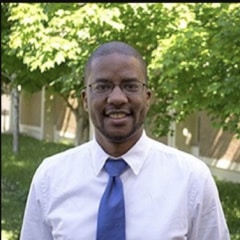
Major Disciplines: Higher Education, Mathematics Education, Pedagogy, Qualitative Research Methods, STEM Education, Teacher Education
Areas of Research: African-American Students, Education Finance, Teachers, Race, School-to-Postsecondary Education Transitions, Urban Students
Methods: Qualitative, Ethnography, Case Study
Odis Johnson, Johns Hopkins University
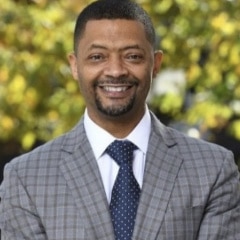
Major Disciplines: Education, Geography, Policy Studies, Quantitative Research Methods, Sociology, Statistics/Measurement/Research Methods, STEM Education, Public Health
Areas of Research: Achievement, African-American Students, Gender, Race, Social Class/Stratification, Urban Students, Neighborhoods, Housing, Discipline
Methods: Quantitative, Mixed Methods, Legal/Policy Analysis, Data Science
Odis Johnson Jr., PhD, is the Bloomberg Distinguished Professor of Social Policy and STEM Equity at Johns Hopkins University, with faculty appointments in the Department of Health Policy and Management at the Bloomberg School of Public Health, the School of Education as Executive Director of the Hopkins Center for Safe and Healthy Schools, and in the Department of Sociology. He also directs the National Science Foundation (NSF) Institute in Critical Quantitative, Computational, and Mixed Methodologies (ICQCM), and serves as co-editor of the Sociology of Education, a journal of the American Sociological Association. Dr. Johnson’s work on the interrelated topics of social policy, data science, and race have been funded by the National Institutes of Health, Joyce Foundation, William T. Grant Foundation, the Robert Wood Johnson Foundation, the Spencer Foundation, and as a 5-time NSF Principal Investigator. He has recently led the Fatal Interactions with Police Study, and the Race, Gender, and Social Control in STEM Lab with support from NSF. A transdisciplinary scholar, his work appears in the leading journals of 11 scientific disciplines and fields. In 2021, he received 3-year appointments to scientific advisory boards at the Educational Testing Service, U.S. Dept. of Housing and Urban Development, U.S. Dept. of Education, and provided expert testimony to the National Academies of Science, Engineering, and Medicine about the future of methods and measurement. A noted voice for justice and equity, Dr. Johnson’s work and ideas about social change were mentioned in more than 400 broadcast and news media outlets in 2022.
Nicole Joseph, Vanderbilt University
Nicole M. Joseph is an associate professor with tenure of mathematics education in the department of Teaching and Learning at Vanderbilt University. She is also the Associate Dean of Equity, Diversity, and Inclusion at Peabody College. She directs the Joseph Mathematics Education Research Lab (JMEL), an intergenerational lab that focuses on training and mentoring its members on Black Feminist and intersectional epistemological orientations. Using critical perspectives, JMEL produces theoretical and methodological scholarship that challenges hegemonic notions of objectivity to emphasize more humanizing, empowering, and transformative research. Dr. Joseph’s research explores two lines of inquiry, (a) Black women and girls, their identity development, and their experiences in mathematics and (b) gendered anti-blackness, whiteness, white supremacy and how these systems of oppression shape Black girls’ learning, access, underrepresentation, and retention in mathematics across the pipeline. Her scholarship has been published in top-tiered journals such as Educational Researcher, Review of Educational Research, Teachers College Record, Harvard Education Review, and the Journal of Negro Education. Dr. Joseph’s research perspective was also featured in Essence Magazine (February 2018). Her activist work includes founding the Tennessee March for Black Women in STEM, an event held every fall that seeks to bring together the Tennessee community to raise awareness about issues Black women and girls face in STEM learning, education, and industry. She is also the founder and director of Black Girls Becoming Summer Research Institute, a two-week residential program at Vanderbilt for rising 7th and 8th grade Black girls focused on a holistic STEAM curriculum.

Major Disciplines: Education, Mathematics Education, Pedagogy, Qualitative Research Methods, Teacher Education, Women’s Studies
Areas of Research: African-American Students, Equity and Diversity, Gender, Identity, Informal/Out-of-School Learning, Race, Teaching/Pedagogical Studies
Methods: Archival, Qualitative, Psychometrics
Elham Kazemi, University of Washington (Executive Board Member)

In collaboration with other researchers, teachers, and school leaders, Dr. Kazemi studies how strong professional learning communities develop in schools serving students from racially, linguistically, and culturally diverse communities. Central to this work is understanding the complex work of eliciting and responding to children’s mathematical thinking, building joyful classroom communities where children feel they are known and seen, and designing professional learning experiences so that teachers learn with and from their students. She collaborates with teachers and leaders to recognize and tackle inequities perpetuated both at a structural level through school policies and practices and in everyday interactions in the classroom. Her research has included close study of classroom discourse and children’s disciplinary identities, pedagogies of teacher education, and teacher educator and leadership practice. She draws on equity and justice-oriented research on children’s mathematical thinking, classroom practice, and organizational learning.
Rachel Lambert, University of California, Santa Barbara
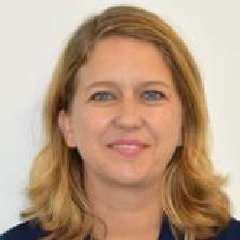
Major Disciplines: Education, Mathematics Education, Pedagogy, Politics of Education, Psychology, Qualitative Research Methods, Special Education, Disability Studies
Areas of Research: African-American Students, Ambitious Instruction, Asian Students, Bilingual/Multilingual Learners, Classroom Discourse, Equity and Diversity, Gender, Identity, Immigrants, Latine Students, Learning, Middle School Education, Primary School Education, Teachers, Race, Social and Emotional Learning, Teaching/Pedagogical Studies, Urban Students, White Students, Disabled Students, Neurodiversity
Methods: Qualitative, Discourse Analysis, Ethnography, Design-Based Research, Theory/Philosophy, Narrative Analysis
Dr. Rachel Lambert is an Associate Professor in Special Education and Mathematics Education at the University of California Santa Barbara. Before becoming a researcher, she worked for over 10 years as both a special education and a general education inclusion teacher. Her work has focused on critical analysis of research in both special education and mathematics education using a disability studies in education lens. Dr. Lambert researches emotion and identity in mathematics classrooms, particularly for neurodiverse students of color. She has designed a mathematical version of Universal Design for Learning that integrates Design Thinking (UDL Math). Other current work includes designing agentic intervention through non-digital games.
Gregory Larnell, University of Illinois at Chicago
Dr. Gregory Larnell specializes in the study of mathematics education as a curricular field, as an institutional-policy enterprise, and as a site for experiencing learning and teaching. He has drawn on theoretical ideas from multiple fields toward critically examining the role of standards in school mathematics; Black learners’ experiences in non-credit remedial mathematics courses; teaching and learning mathematics for social justice; identities, stereotypes, and mathematics-learning experiences; urban mathematics education; and the use of critical race theory in mathematics education research. He is currently developing projects on Black family mathematics socialization, mathematics and citizenship, STEM-mentoring experiences, and the question of equity in mathematics education. His scholarship has been published in several journals and edited volumes; find and download his work here.
Dr. Larnell develops and teaches undergraduate and graduate courses in the College of Education across curricular and degree programs (including in the general education program): Introduction to Urban Education; STEM, Education, and Society; Teaching and Learning Elementary Mathematics in the Urban Classroom; Research on the Learning of Mathematics; Research on the Mathematics Teachers and Teaching; and Curriculum and Teaching. He also serves in multiple service capacities locally, institutionally, nationally, and internationally—including faculty mentoring programs; community organizations; ad-hoc reviewing for the National Science Foundation, Journal for Research in Mathematics Education, American Educational Research Journal, The Urban Review (among others); and a past invited member of the National Council for Teachers of Mathematics Research Committee and the American Educational Research Journal editorial board.

Major Disciplines: Education, Higher Education, Literacy Ed./Reading/Language Development, Mathematics Education, Multicultural Education, Policy Studies, Politics of Education, Qualitative Research Methods, STEM Education, Teacher Education, Urban Education
Areas of Research: African-American Students, Classroom Discourse, Equity and Diversity, Identity, Postsecondary & Adult Education, School-to-Postsecondary Education Transitions, Urban Students, Parents and Families
Methods: Qualitative, Discourse Analysis, Ethnography, Narrative Analysis
Carol Lee, Northwestern University (Executive Board Member)
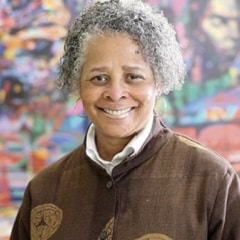
Amanda Lewis, University of Illinois at Chicago
Amanda E. Lewis is the Director of the Institute for Research on Race and Public Policy and College of Liberal Arts & Sciences Distinguished Professor of Black Studies and Sociology at the University of Illinois at Chicago. Her research focuses on how race shapes educational opportunities and on how our ideas about race get negotiated in everyday life. She is the author of several award-winning books including, with co-author John Diamond, Despite the Best Intentions: Why racial inequality persists in good schools (Oxford University Press, 2015), and Race in the Schoolyard: Negotiating the color-line in classrooms and communities (Rutgers University Press 2003). Her research has appeared in a number of academic venues including Sociological Theory, American Educational Research Journal, Ethnic & Racial Studies, Educational Researcher, Anthropology and Education Quarterly, The Sociology of Race and Ethnicity, Urban Education and The Du Bois Review. She has received numerous grants and awards including from the National Science Foundation, National Institutes of Health, Spencer Foundation, Russell Sage Foundation, MacArthur Foundation, Field Foundation, and the American Sociological Association. As Director of IRRPP, she has co-authored a number of reports as part of the State of Racial Justice in Chicago project chronicling the experiences and conditions of racial/ethnic groups in the city. Dr. Lewis lectures and consults regularly on issues of racial and educational equity and contemporary forms of racism.

Major Disciplines: Education, Ethnic Studies, Qualitative Research Methods, Sociology
Areas of Research: African-American Students, Equity and Diversity, Identity, Race, Urban Students, White Students
Methods: Qualitative, Ethnography, Mixed Methods
Katherine Lewis, University of Washington
Katie Lewis is an Associate Professor at the University of Washington’s College of Education. Her research lies at the intersection of mathematics education and critical special education. She is concerned with understanding the nature of mathematics disabilities (dyscalculia) and designing accessible educational contexts – particularly for students with disabilities and students in foster care. In the context of authentic learning environments, she evaluates the accessibility of mathematics instruction, designs more accessible mediational tools, and considers the ways in which students with disabilities actively create access for themselves. Her work draws upon sociocultural theories and Disability Studies, and has been informed by her own firsthand experience having a learning disability. In her teaching she focuses on supporting preservice special education teachers to engage in anti-deficit high quality inquiry-oriented mathematics assessment and instruction. Her work has been published in Journal for Research in Mathematics Education, Journal of the Learning Sciences, Journal of Mathematical Behavior, and Cognition & Instruction, among others. Her work has been funded by a Spencer Dissertation Award and a National Academy of Education / Spencer Postdoctoral Fellowship.
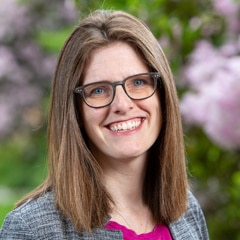
Major Disciplines: Education, Learning Sciences, Mathematics Education, Qualitative Research Methods, Special Education, Teacher Education, Disability Studies
Areas of Research: Equity and Diversity, Learning, Identity, Middle School Education, Disability Studies, Community College Education, Students in Foster Care
Methods: Qualitative, Design-Based Research, Case Study
Luis Antonio Leyva, Vanderbilt University
Luis Antonio Leyva is an Associate Professor of Mathematics Education & STEM Higher Education in the Department of Teaching & Learning at Vanderbilt University – Peabody College of Education & Human Development. He directs the Power, Resistance & Identity in STEM Education (PRISM) Research Lab. His research examines and seeks to disrupt how interlocking systems of power, including racism and cisheteropatriarchy, shape classroom teaching and student support in undergraduate mathematics and STEM higher education broadly. He centers undergraduate STEM students’ narratives of oppression, agency, and support to uncover how educational practices limit and expand learning opportunities that affirm their identities across intersections of race, gender, sexuality, and other social differences. Leyva draws on critical race theory, women of color feminisms, and queer of color critique to ground his research conceptually and methodologically. Leyva’s research has been supported by the Bill & Melinda Gates Foundation (Mindset Scholars Network), National Academy of Education/Spencer Foundation, and National Science Foundation.
Leyva has published his research in the American Educational Research Journal, Cognition & Instruction, The Journal of Higher Education, Journal for Research in Mathematics Education, and Journal for Women and Minorities in Science and Engineering. His scholarship has been distinguished with various national awards and honors, including Emerging Scholar honoree (Diverse: Issues in Higher Education, 2024), LGBTQ+ Educator of the Year Award (Out to Innovate, 2022), and Early-Career Publication Award (AERA Special Interest Group on Research in Mathematics Education, 2018). Leyva holds experience with editorial leadership in the International Journal of Qualitative Studies in Education, Journal of Diversity in Higher Education, and Journal for Research in Mathematics Education. Prior to his faculty appointment, Leyva was certified as a high school mathematics teacher and worked in several student support programs for historically marginalized populations in STEM, including the STEM Talent Expansion Program and the TRIO Upward Bound Math-Science program.

Major Disciplines: Mathematics Education, Higher Education, STEM Education, Gender Studies, LGBTQ Studies in Education, Pedagogy, Politics of Education, Qualitative Research Methods
Areas of Research: Educational Equity, Gender, Identity, Intersectionality, Latiné Students, Postsecondary & Adult Education, Queer and Trans* Students of Color, Race, School-to-Postsecondary Education Transitions, Sexuality, Teaching/Pedagogical Studies, Undergraduate STEM
Methods: Case Study, Classroom Observations, Critical Race Methodology (Counterstorytelling), Ethnographic Methods, Interviews, Narrative Analysis, Qualitative, Queer of Color Analysis/Critique, Theory/Philosophy
Sarah Lubienski, Indiana University Bloomington

Major Disciplines: Mathematics Education, Pedagogy, Policy Studies, Sociology, Teacher Education
Areas of Research: Achievement, Classroom Discourse, Equity and Diversity, Gender, Teachers, Race, School Reform, Social Class/Stratification, Math Problem Solving
Methods: Quantitative, Mixed Methods
Dr. Sarah Lubienski is a professor of mathematics education and the Executive Associate Dean of the Indiana University Bloomington School of Education. Her research focuses on inequities in students’ mathematics outcomes and the policies and practices that shape those outcomes. She examines gender, social class, and race in large-scale studies using national datasets, as well as in smaller, classroom-based studies. She also critically analyzes tradeoffs of ways that equity is discussed within the education research community. Her most recent research considers whether “good girl” socialization might inhibit the development of bold problem-solving approaches and contribute to gender disparities in mathematics outcomes. In addition to authoring numerous articles in prominent journals, Dr. Lubienski co-authored the book, The Public School Advantage: Why Public Schools Outperform Private Schools, which links mathematics education reform with public school students’ relatively high achievement, winning a 2015 American Publisher’s Award for Professional and Scholarly Excellence. She previously served as Associate Dean and Interim Dean of the Graduate College at the University of Illinois Urbana-Champaign, where she also served as the director of the STEM Education Research Collaborative. She was PI of the Postdoctoral Research Training Program in Mathematics Education funded by the Institute of Education Sciences, and her research has also been funded by the National Center of Education Statistics and the Fulbright Program. She has served in several leadership roles within the American Educational Research Association (AERA) and is an AERA Fellow. She holds a Ph.D. in Curriculum, Teaching and Educational Policy from Michigan State University.
Tia Madkins, The University of Texas at

Major Disciplines: Cultural Studies, Education, Learning Sciences, Mathematics Education, Pedagogy, Qualitative Research Methods, Science Education, STEM Education, Teacher Education
Areas of Research: African American, Equity and Diversity, Identity, Primary School Education, Race, Teaching/Pedagogical Studies, Urban Students,
Methods: Qualitative, Mixed Methods
Dr. Tia C. Madkins is an assistant professor in the STEM Education Program and the Department of Curriculum and Instruction in the College of Education and a faculty research affiliate with the Population Research Center and the Center for the Study of Race and Democracy at The University of Texas at Austin. Her research focuses on supporting PK-16 educators to design inclusive STEM+ computing classrooms and engage equity-focused teaching practices to transform learning environments for minoritized learners, especially Black girls.
Luz Maldonado Rodriguez, Texas State University
Dr. Luz A. Maldonado Rodríguez is an associate professor of Bilingual Mathematics Education in the department of Curriculum and Instruction. She earned her PhD in Mathematics Education with a doctoral portfolio in Mexican American Studies from the University of Texas at Austin. She has a M.S. in Mathematics Education with a Minor in Bilingual/Bicultural Education from Teachers College, Columbia University and a BS in Mechanical Engineering from Rice University.
Dra. Maldonado Rodríguez has taught elementary mathematics methods courses at central Texas universities for over 10 years and conducts yearlong professional development sessions on Cognitively Guided Instruction with K-6th grade teachers from Texas, Arkansas, Florida and California. Dra. Maldonado Rodríguez’s primary research interests follow the mathematical learning experiences of the bilingual learner, from elementary student to pre-service teachers, in particular documenting humanizing teaching and learning practices. Her research is currently focused on understanding translanguaging in the bilingual elementary classroom in which students are encouraged to develop their bilingual identities and utilize their entire linguistic repertoires to engage in mathematics.
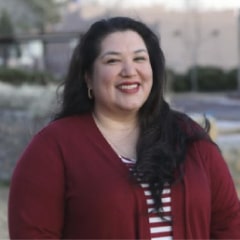
Major Disciplines: Bilingual Education, Education, Mathematics Education, Qualitative Research Methods, Teacher Education
Areas of Research: Bilingual/Multilingual Learners, Classroom Discourse, Equity and Diversity, Language, Latine Students, Learning, Teachers, Race
Methods: Qualitative
Danny Martin, University of Illinois Chicago (Executive Board Member)
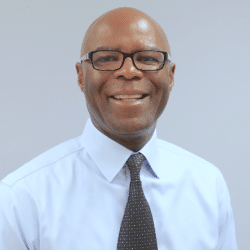
Dr. Danny Bernard Martin is Professor of Education and Mathematics at the University of Illinois Chicago. He teaches math content and urban education courses in the undergraduate elementary education program as well as courses in the PhD program in Mathematics and Science Education (MSE) and Critical Pedagogy and Urban Teacher Education (CPUTE). He served as Department Chair of Curriculum and Instruction from 2006-2011 and again from 2013-2016. Prior to coming to UIC, Dr. Martin was Instructor and Professor in the Department of Mathematics at Contra Costa College for 14 years, serving as Chair for three years. He was a National Academy of Education/Spencer Postdoctoral Fellow from 1998-2000.
Dr. Martin’s research has focused primarily on understanding race, socialization, and identity in Black learners’ mathematical experiences. He is author of Mathematics Success and Failure Among African Youth (2000/2006, Erlbaum), co-author of The Impact of Identity in K–8 Mathematics Learning and Teaching: Rethinking Equity-Based Practices (2013, NCTM), co-author of The Impact of Identity in K–12 Mathematics Learning and Teaching: Rethinking Equity-Based Practices, Expanded Edition (2024, NCTM), editor of Mathematics Teaching, Learning, and Liberation in the Lives of Black Children (2009, Routledge), and co-editor of The Brilliance of Black Children in Mathematics: Beyond the Numbers and Toward New Discourse (2013, Information Age).
Lou Matthews, Urban Teachers
Dr. Lou Matthews is a global mathematics creative, leader, and the founder of InspireMath, where he is dedicated to developing sustainable and authentic math and STEM experiences in communities worldwide. With his extensive experience in national and international initiatives across the United States, and Caribbean and African diasporas, Dr. Lou has responded to the critical need for responsive math and STEM education. As a regarded equity and belonging advocate and sought-after speaker, Dr. Lou has logged countless hours in schools and classrooms supporting educators and leaders in cultivating inspiring math and STEM content experiences. Drawing from turbulent social times, Dr. Lou invented the acclaimed Hope Wheel in 2019 as an innovative planning tool to inspire the redesign of mathematics learning. In 2020, he created Pi Before Dinner, an ongoing online math network of educators, parents, and media channels. Over the years, he has authored several books, studies, chapters, blogs, and videos on culturally relevant mathematics teaching. Dr. Lou’s co-authored book, Engaging in Culturally Relevant Math Tasks: Fostering Hope in the Elementary Classroom, has achieved publisher best-seller status. He also led the founding of the Journal of Urban Mathematics Education in 2008, serving as its founding editor in chief. Dr. Lou continues to impact the preparation of STEM teachers. As the Director of Mathematics and Science at Urban Teachers, a teacher residency program in partnership with American University, Dr. Lou leads the development and coaching of culturally responsive mathematics teachers in Baltimore, Philadelphia, Washington, DC, and Dallas.

Major Disciplines: Cultural Studies, Education, Mathematics Education, Pedagogy, STEM Education, Teacher Education
Areas of Research: African-American Students, Equity and Diversity, Teachers, Race, Teaching/Pedagogical Studies, Urban Students, Black students (including African and Caribbean diaspora)
Methods: Qualitative, Ethnography, Theory/Philosophy
Percival Matthews, University of Wisconsin–Madison

Major Disciplines: Behavioral Sciences, Education, Human Development, Mathematics Education, Psychology
Areas of Research: Learning, Primary School Education, Secondary School Education, Fractions Knowledge, Early Algebra, Procedural and Conceptual Knowledge
Methods: Quantitative, Experimental Methods
Percival Matthews is an Associate Professor in the Department of Educational Psychology whose interests focus on the ways the people learn about math and number. The bulk of his research is organized around two primary goals: (1) understanding the basic underpinnings of human mathematical cognition and (2) finding ways to leverage this understanding to create effective pedagogical techniques that can be used to impact the life chances of everyday students.
Karen Mayfield-Ingram, Lawrence Hall of Science (Executive Board Member)
Karen Mayfield-Ingram is the project director of the Oakland Urban Teacher Residency Program. She also is a program coordinator for the Center for Equity and Excellence at the Lawrence Hall of Science at the University of California – Berkeley and Associate Director of the Bay Area Math Project. Ms. Mayfield-Ingram has 15 years of teaching experience and has conducted numerous workshops and given keynote addresses on mathematics and equity, and transitioning to the Common Core State Standards in Mathematics (CCSS-M) at the state and national level. She is the co-author of several books about teaching, including Rethinking K-8 Mathematics Teaching: Equity-Based Practices to Strengthen Children’s Mathematics Learning and Identity published by the National Council of Teachers of Mathematics. Her work focuses on equitable mathematics teaching and learning, teacher education and parent involvement with a primary goal of strengthening access and advancement in mathematics education for historically marginalized youth.
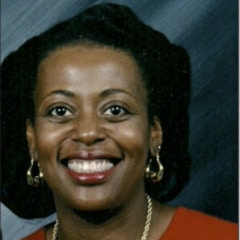
Ebony McGee, Johns Hopkins University

Major Disciplines: Education, Ethnic Studies, Higher Education, Mathematics Education, Qualitative Research Methods, Technology Studies
Areas of Research: African-American Students, Asian Students, Equity and Diversity, Gender, Identity, Native American Students, Technology, Race
Methods: Qualitative, Discourse Analysis, Ethnography, Mixed Methods
Research interests include the role of racialized biases in science, technology, engineering, and mathematics (STEM) that influence high achieving historically marginalized students’ graduate and career trajectories, particularly their interest in college faculty positions. The role of resiliency, wellness and mental health issues for mathematically high-achieving African American high school and post-secondary students; and identity (racial, mathematics, ethnic) development in high-achieving historically marginalized STEM students of color.
As a National Science Foundation Postdoctoral Fellow working with the Scientific Careers Research and Development Group, at Northwestern University, Dr. McGee performed a two-year research study on 61 Black, Latino, and Asian physical science and mathematics advanced undergraduate students, to better understand why so few academically successful Black and Latino STEM college students are pursuing graduate education or careers in their respective disciplines.
Gigliana Melzi, New York University
Gigliana Melzi is Professor of Applied Psychology and affiliated faculty at the Center for Latin American and Caribbean Studies in New York University. Dr. Melzi’s work examines the intersection of cultural and linguistic practices and their relation to child development and learning. Using mixed-methods and emic approaches, she investigates how Latine immigrant parents nurture their children, the role of language in that process, and how classroom instruction can leverage these culturally and linguistically grounded practices to support young children’s school-based learning. Her latest work focuses on Latine family math and science practices. Dr. Melzi’s research has been funded by the Spencer Foundation, National Institute of Health, the U.S. Department of Health and Human Services, and lately by the Brady Education Foundation, the Brooke Astor Foundation, the Heising-Simons Foundation, and the National Science Foundation.
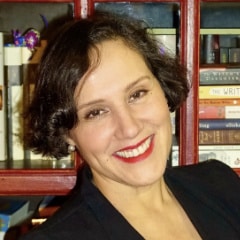
Major Disciplines: Bilingual Education, Human Development, Linguistics, Literacy Ed./Reading/Language Development, Mathematics Education, Psychology
Areas of Research: Bilingual/Multilingual Learners, Classroom Discourse, Early Childhood Education, Equity and Diversity, Immigrants, Informal/Out-of-School Learning, Language, Latine Students, Literacy
Methods: Quantitative, Qualitative, Mixed Methods
Vilma Mesa, University of Michigan
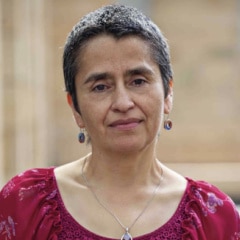
Major Disciplines: Education, Mathematics Education, Qualitative Research Methods, Quantitative Research Methods, STEM Education
Areas of Research: Postsecondary & Adult Education, Teacher Knowledge, Community Colleges, Interactive Textbooks
Methods: Quantitative, Qualitative, Discourse Analysis, Mixed Methods, Design-Based Research, Psychometrics
Vilma Mesa is Professor of Education and Mathematics at the University of Michigan, and Faculty Associate at the Center for the Study of Higher and Post-secondary Education at the University of Michigan. She investigates the role that resources play in developing teaching expertise in undergraduate mathematics, specifically at community colleges and in inquiry-based learning classrooms. She has conducted several analyses of instruction and of textbooks and collaborated in evaluation projects on the impact of innovative mathematics teaching practices for students in science, technology, engineering, and mathematics. She is the 2022 recipient of the Association of Women in Mathematics’ Loiuse May Award for Contributions to Mathematics Education and 2022 University of Michigan’s the Outstanding Undergraduate Research Opportunity Mentor Award. She served as Associate Editor for the Journal for Research in Mathematics Education from 2000-2004 and is currently serving as associate editor for Educational Studies in Mathematics. She participated in the development of a video-based observation instrument, Evaluating the Quality of Postsecondary Mathematics Instruction, (EQIPM), which identifies three dimensions of quality. She is studying the use of open source and open access university mathematics textbooks by teachers and students. She has conducted several analyses of textbooks and has been involved in evaluation projects that study the impact of innovative teaching practices in mathematics for students in science, technology, engineering, and mathematics fields. She was co-PI of the Mathematical Association of America’s National Study of Calculus, funded by the National Science Foundation. She was a research associate at “una empresa docente” a research center in Mathematics Education at the University of Los Andes, in Bogotá, Colombia where she co-authored university textbooks for pre-calculus for engineering and probability and statistics for social science majors. She has published over 60 articles and book chapters in mathematics education and raised over $6M in federal funding to support her work. Prior to her career in education, Mesa was a systems programmer for the ministry of finances in Colombia and for the district of Bogotá, and a computing systems advisor for a large construction and hospitality firm in Colombia. She has a B.S. in computer sciences and a B.S. in mathematics from the University of Los Andes in Bogotá, Colombia, and a master’s and a Ph.D. in mathematics education from the University of Georgia.
Judit Moschkovich, University of California, Santa Cruz (Executive Board Member)
Dr. Moschkovich received her PhD from UC Berkeley, Department of Education in Mathematics Science and Technology (EMST). Before coming to UCSC in 1999, she was a lecturer at UC Berkeley, a Researcher at IRL (Institute for Research on Learning) in Palo Alto, and a Project Director at TERC in Cambridge, MA. At IRL she collaborated with MMAP (Middle School Mathematics through Applications) project, conducting research in mathematics classrooms. While at IRL she was awarded a National Science Foundation Research Planning Grant and a National Academy of Education (NAE/Spencer) Postdoctoral Fellowship. She also worked at TERC, collaborating with the Cheche Konnen project and as Principal Investigator on the NSF research project “Mathematical discourse in bilingual settings: Teaching and learning mathematics in two languages.” She is also a former mathematics instructor (San Francisco State University, USF Upward Bound Program, and UCSC Yo Puedo Programs).
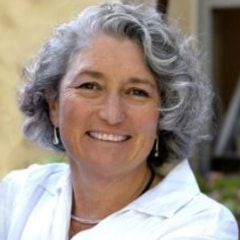
Major Disciplines: Mathematics Education, Learning Sciences, STEM Education
Areas of Research: Mathematics Education, Learning Sciences, Classroom Discourse, Equity
and Diversity, Bilingual/Multilingual Learners, Latine students, Middle and
Secondary Mathematics
Methods: Qualitative Methods, Classroom Observations, Video Analysis, Discourse
Analysis, Ethnographic Methods
Charles Munter, University of Missouri

Major Disciplines: Cultural Studies, Education, Learning Sciences, Mathematics Education, Teacher Education
Areas of Research: Ambitious Instruction, Equity and Diversity, Teachers, School Reform, Teaching/Pedagogical Studies
Methods: Qualitative, Mixed Methods, Design-Based Research
Charles Munter is an associate professor of mathematics education at a public research university in Missouri. He is interested in district- and state-level policy contexts of mathematics education, with foci on the institutional setting of teaching and designing for equity.
Na’ilah Nasir, Spencer Foundation (Executive Board Member)
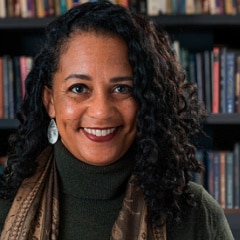
Jennifer Osuna, Stanford University

Beatriz Quintos, University of Maryland
Beatriz Quintos is a Clinical Associate Professor in the Department of Teaching and Learning, Policy and Leadership, at University of Maryland. The long-term goal of her work is to interrupt historical patterns of marginalization in schools by collaborating with teachers and families to create contexts that value and tap into multilingual children’s mathematical thinking and linguistic expertise. She works to create partnerships with families and educators that position multilingual children as assets in the mathematics classroom. Her recent work highlights the critical role of bilingual communities’ cultural and linguistic funds of knowledge to create culturally-sustaining learning environments in mathematics education.
Major Disciplines: Bilingual Education, Mathematics Education, Multicultural Education, Qualitative Research Methods, Teacher Education, Family/Community Engagement in Mathematics
Areas of Research: Teachers’ Professional development, Bilingual/Multilingual Learners, Equity and Diversity, Immigrants, Latine Students, Multicultural Education and Diversity, Culturally Sustaining Pedagogies, Primary School Education, Teachers, School/Community Partnerships
Methods: Qualitative, Discourse Analysis, Community-based participatory research

Aria Razfar, University of Illinois at Chicago

Major Disciplines: Anthropology, Bilingual Education, Education, Higher Education, Human Development, Human Rights Education, Learning Sciences, Linguistics, Literacy Ed./Reading/Language Development, Mathematics Education, Medicine, Multicultural Education, Qualitative Research Methods, Religion/Theology, Science Education, STEM Education, Teacher Education
Areas of Research: African-American Students, Bilingual/Multilingual Learners, Classroom Discourse, Early Childhood Education, Equity and Diversity, Foreign Language Studies, Gender, Identity, Immigrants, Indigenous Students, Informal/Out-of-School Learning, Language, Latine Students, Learning, Literacy, Multicultural Education and Diversity, Teachers, Race, Religion, School/Community Partnerships, Urban Students, Narrative Inquiry, Medical Education
Methods: Qualitative, Discourse Analysis, Ethnography, Mixed Methods, Design-Based Research, Narrative Analysis
Dr. Aria Razfar is Professor of Literacy, Language, and Culture and affiliate with Linguistics and Medical Education at the University of Illinois Chicago. He earned his PhD from the University of California, Los Angeles in 2003. Dr. Razfar has established himself as one of the leading scholars in the fields of applied linguistics, education, and learning sciences. The U.S. Department of Education and the National Science Foundation have provided major funding for his research on language learning, mathematics, and science. In 2014, Dr. Razfar was recognized for his scholarship by being named the University of Illinois at Chicago’s Researcher of the Year for the Social Sciences. Dr. Razfar has authored theoretically driven empirical studies and conceptual pieces that draw on qualitative and quantitative methods, sociocultural theories of learning, and the application of language ideologies in urban schools. His publications have appeared in premiere academic journals such as Anthropology of Education Quarterly, Human Development, Linguistics and Education, Mind, Culture, and Activity, and TESOL Quarterly. Dr. Razfar is also lead author of Applying Linguistics in the Classroom: A Sociocultural Perspective (2014) and Action Research in STEM and English Language Learning: An Integrated Approach for Developing Teacher Researchers (2022) (Routledge Press). He has served on the University Senate Conference, including three years as Chair of the Academic Affairs and Research Committee as well as Chair of the Discovery Partner Institute’s Executive Committee.
Catherine Riegle-Crumb, The University of Texas at Austin
Dr. Riegle-Crumb’s research interests center upon gender and racial/ethnic inequality in educational experiences and achievement. As a sociologist of education, she is particularly interested in the role of social contexts, including friendships, schools, and communities, in increasing or ameliorating educational disparities in math and science. Her research also focuses on the complex intersection between gender and race/ethnicity with regard to educational inequality. Dr. Riegle-Crumb’s work has been funded with grants from several agencies and foundations, including the National Science Foundation and the National Institutes of Health. Her research expertise includes quantitative research methods and analyses of national datasets.

Major Disciplines: Education, Higher Education, Mathematics Education, Psychology, Qualitative Research Methods, Science Education, Sociology, STEM Education, Women’s Studies
Areas of Research: Achievement, Gender, Race, Social Class/Stratification
Methods: Quantitative, Mixed Methods
Barbara Rogoff, University of California-Santa Cruz
Barbara Rogoff is UCSC Foundation Distinguished Professor of Psychology at the University of California-Santa Cruz. She investigates cultural aspects of children’s learning and how communities arrange for learning, finding especially sophisticated collaboration and attention among children from Indigenous communities of the Americas. She received a Distinguished Lifetime Contributions Award (Society for Research in Child Development), the Distinguished Contributions to Developmental Science Award (Jean Piaget Society) and the Chemers Award for Outstanding Research (UCSC). She is an elected member of the American Academy of Arts and Sciences and the National Academy of Education, and a Fellow of the AAA, APS, APA, and AERA. She has held the University of California Presidential Chair and Fellowships of the Center for Advanced Study in the Behavioral Sciences, Kellogg Foundation, Spencer Foundation, and the Exploratorium, and served as Editor of Human Development.
Her recent books have received major awards: Learning Together (finalist for the Maccoby Award, APA); The Cultural Nature of Human Development (APA William James Book Award); and Developing Destinies: A Mayan Midwife and Town (Maccoby Award, APA). Together with colleagues, she recently published a journal special issue in Spanish and English, “Learning as a community process of observing and pitching in.” Journal for the Study of Education and Development / Infancia y Aprendizaje (2022).
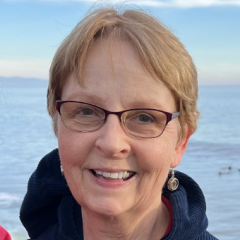
Major Disciplines: Ethnic/Cultural Studies, Human Development, Learning Sciences, Psychology
Areas of Research: Immigrants, Informal/Out-of-School Learning, Latinx Students, Multicultural Education and Diversity, Native American Students, Social and Emotional Learning, White Students
Methods: Archival, Quantitative, Qualitative, Ethnography, Mixed Methods, Comparative, Theory/Philosophy
Maria Araceli Ruiz-Primo, Stanford University
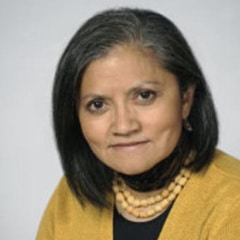
Major Disciplines: Education
Areas of Research: Achievement, Classroom Discourse, Assessment, Assessment Development, Assessment Evaluation
Methods: Quantitative, Qualitative
Maria Araceli Ruiz-Primo is an Associate Professor at the Graduate School of Education, Stanford University where she is director of the Laboratory of Educational Assessment, Research, and InnovatioN (LEARN). Her work, funded mainly by the National Science Foundation and the Institute of Education Sciences, examines assessment practices and the assessment of student learning both in the classroom and in large-scale assessment programs. Her publications address the development and evaluation of multiple learning assessment strategies, including concept maps and students’ science notebooks, and the study of teachers’ informal and formal formative assessment practices such as the use of assessment conversations and embedded assessments. Her recent work focuses on the development and evaluation of assessments that are instructionally sensitive and instruments intended to measure teachers’ formative assessment practices. She is co-editor of a special issue on assessment in the Journal of Research in Science Teaching and a special issue on classroom assessment in the Journal of Educational Measurement. She has published in Science, Educational Measurement: Issues and Practices, the Journal of Research in Science Teaching, and other major technical educational research journals.
Geoffrey Saxe, University of California, Berkley
Geoffrey Saxe is a Professor of the Graduate School at UC Berkeley. His research has focused on learning processes in varied settings—elementary and middle school classrooms in the United States, remote settings in Papua New Guinea, urban and rural areas of Northeastern Brazil, family practices involving numerical activities in the lives of toddlers in New York. He has been awarded grants from the National Science Foundation, the Spencer Foundation, and the Institute of Education Sciences. He has received fellowships as a visiting scholar at the Center for Advanced Study in the Behavioral Sciences at Stanford University and Rockefeller’s Bellagio Center in Italy. His books and monographs include Social Processes in Early Number Development (with S. Guberman and M. Gearhart, 1987), Culture and Cognitive Development: Studies in Mathematical Understanding (1991), Cultural Development of Mathematical Ideas: Papua New Guinea studies (2012). His most recent book, Cultural Development of Mathematical Ideas, received most outstanding book awards from the American Psychological Association (2015), the American Anthropological Association (2014), and the Cognitive Development Society (2013), and he received two Presidential citations from the American Educational Research Association for his research on culture-cognition relations (2010, 2022). He is past Editor of the journal, Human Development, and he is past-President of the Jean Piaget Society for the Study of Knowledge and Development. He has been an elected member of the National Academy of Education in the United States since 2005, and an inaugural fellow of the American Educational Research Association.

Major Disciplines: Anthropology, Human Development, Learning Sciences, Mathematics Education, Psychology
Areas of Research: Informal/Out-of-School Learning, Learning, Teaching/Pedagogical Studies, Cognitive Development
Methods: Mixed Methods, Design-Based Research, Theory/Philosophy
William Schmidt, Michigan State University

Major Disciplines: Art Education, Behavioral Sciences, Comparative Education, Education, Learning Sciences, Mathematics Education, Policy Studies, Politics of Education, Quantitative Research Methods, Science Education, Statistics/Measurement/Research Methods, Quantitative Studies Related to Issues of Inequalities of Opportunities to Learn Mathematics
Areas of Research: Achievement, African-American Students, Ambitious Instruction, Arts, Equity and Diversity, Gender, Latine Students, Learning, Primary School Education, Teachers, Race, Secondary School Education, Social Class/Stratification, White Students
Methods: Quantitative, Mixed Methods, Comparative, Design-Based Research, Psychometrics
William Schmidt is a University Distinguished Professor and founder and director of the Center for the Study of Curriculum Policy. He holds a faculty appointment in Educational Statistics and Measurement and a courtesy appointment in the Department of Statistics. He is a member of the National Academy of Education as well as the International Academy of Education, an American Educational Research Association (AERA) Fellow, and an OECD Thomas J. Alexander Fellow for education quality and equity. He was recently awarded the 2022 AERA Distinguished Contributions to Research in Education Award. He has published in numerous journals including the Journal of the American Statistical Association, Education Researcher, Georgetown Journal of International Affairs, American Affairs Journal, Journal of Educational Statistics, Educational Evaluation and Policy Analysis, Journal of Curriculum Studies, and the Journal of Educational Measurement. His most recent books include “Schooling Across the Globe: What We Have Learned from Sixty Years of Mathematics and Science International Assessments,” “Inequality for All,” and “Why Schools Matter.” His current writing and research interests focus on the effects of curriculum policy on academic achievement. His work also focuses on schooling and how equality of opportunity to learn impacts student performance in mathematics.
Alan Schoenfeld, University of California, Berkeley (Executive Board Member)
Alan Schoenfeld is a Distinguished Professor at the University of California, Berkeley. He holds the Elizabeth and Edward Conner Chair in the School of Education and is an Affiliated Professor in the Mathematics Department. Schoenfeld is a Fellow of the American Association for the Advancement of Science, a Fellow of the American Educational Research Association (AERA), and a Laureate of the education honor society Kappa Delta Pi. He is an elected memberof the International Academy of Education and the U.S. National Academy of Education, and has served as President of AERA and vice President of the National Academy. Schoenfeld holds the International Commission on Mathematics Instruction’s Klein Medal, the highest international distinction in mathematics education; AERA’s Distinguished Contributions to Research in Education award, AERA’s highest honor; and the Mathematical Association of America’s Mary P. Dolciani award, given to a pure or applied mathematician for distinguished contributions to the mathematical education of K-16 students.

Tesha Sengupta-Irving, University of California, Berkley

Major Disciplines: Learning Sciences, Mathematics Education, Pedagogy, Politics of Education, Qualitative Research Methods, STEM Education
Areas of Research: Ambitious Instruction, Classroom Discourse, Equity and Diversity, Identity, Learning, Teaching/Pedagogical Studies
Methods: Qualitative, Ethnography, Design-Based Research
Dr. Tesha Sengupta-Irving’s research concerns the sociocultural, disciplinary, and political dimensions of children’s learning and identity work. Broadly, her research asks a deceptively simple question: What, in addition to mathematics, do children learn when they learn mathematics? Her work advances design principles and pedagogical approaches that promote racially minoritized children’s fluency in disciplinary ideas and practices, while also safeguarding their sense of joy, agency, and collectivity. Through a mix of prolonged ethnographic study, teaching experiments, and microanalyses of children’s interactions, her work generates new knowledge for disciplinary teaching and learning that centers who racially minoritized youth are and are becoming. She holds a BS in Electrical Engineering from the University of Illinois at Urbana-Champaign, and a PhD in Curriculum and Teacher Education from Stanford University.
Niral Shah, University of Washington
Dr. Niral Shah is an Associate Professor of Learning Sciences and Human Development in the College of Education at the University of Washington in Seattle, where he also directs the Race, Theory, and Design Lab. His research concerns how people learn racism and anti-racism. Shah’s prior work has focused on race and racism in STEM education, specifically how racial narratives about STEM ability affect students’ identities and participation in classrooms. He is also a co-developer of the EQUIP classroom observation tool (https://www.equip.ninja/), which supports teachers and educational leaders to identify and mitigate bias in classrooms. Dr. Shah is a National Academy of Education/Spencer Dissertation Fellow and Postdoctoral Fellow, and his work has been funded by the National Science Foundation, Spencer Foundation, and the Institute of Education Sciences.

Major Disciplines: Cultural Studies, Education, Learning Sciences, Mathematics Education, Quantitative Research Methods, STEM Education, Teacher Education,
Areas of Research: African-American Students, Asian Students, Classroom Discourse, Equity and Diversity, Identity, Learning, Race, Teaching/Pedagogical Studies, White Students
Methods: Qualitative, Discourse Analysis, Ethnography, Design-Based Research
David Stinson, Georgia State University
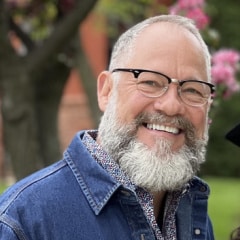
Major Disciplines: Cultural Studies, Education, Mathematics Education, Multicultural Education, Pedagogy, Philosophy, Politics of Education, Quantitative Research Methods, Teacher Education, Women’s Studies
Areas of Research: African-American Students, Equity and Diversity, Gender, Multicultural Education and Diversity, Postsecondary & Adult Education, Teachers, Race, Secondary School Education, Social Class/Stratification, Teaching/Pedagogical Studies, Urban Students
Methods: Qualitative, Ethnography, Theory/Philosophy, Critical and Postmodern Theories
David W. Stinson’s (Ph.D., The University of Georgia) research interests are organized around three broad, interrelated questions: (1) How do students who are constructed outside the White, Christian, heterosexual male of bourgeois privilege successfully accommodate, reconfigure, or resist (i.e., negotiate) the hegemonic discourses of schooling and society? (2) How do mathematics teachers, educators, and researchers incorporate the philosophical and theoretical underpinnings of critical postmodern theory into their education philosophies, pedagogical practices, and/or research methods? (3) How are philosophical considerations taken up differently across the paradigm of inquiry spectrum throughout the ongoing historical moments of mathematics education research? Professor Stinson has authored/coauthored research published in the leading education and mathematics education journals and has authored/coauthored book chapters for several edited volumes, including contributing coauthored chapters to the 2017 National Council of Teachers of Mathematics (NCTM) Compendium for Research in Mathematics Education: “Exploring Different Theoretical Frontiers for Different (and Uncertain) Possibilities in Mathematics Education Research” and to the upcoming Fourth International Handbook of Mathematics Education: “Strengthening Equity and Social Justice Research in Mathematics Education Through Critical Interrogations of White Supremacy and Settler Colonialism.” Professor Stinson was coeditor of Teaching Mathematics for Social Justice: Conversations with Educators (NCTM, 2012) and editor in chief of the Journal of Urban Mathematics Education for 10 years (2009–2018).
Guillermo Solano-Flores, Stanford University
Dr. Guillermo Solano-Flores is Professor of Education, Stanford University Graduate School of Education. His research focuses on the intersection of assessment, cultural and linguistic diversity, and fairness. This research is relevant to the testing of students who are not proficient in English in the U.S., students from different countries in the context of international comparisons, and students with disabilities. His research is based on the use of multidisciplinary approaches that use psychometrics, sociolinguistics, semiotics, and cognitive science in combination. He is the author of the theory of test translation error, which addresses testing across cultures and languages. Also, he has investigated the use of generalizability theory—a psychometric theory of measurement error—in the testing of English language learners and indigenous populations, and the use of Boolean algebra in complex coding endeavors. He has advised Latin American countries on the development of national assessment systems and has been the advisor to countries in Latin America, Asia, Europe, Middle East, and Northern Africa on the adaptation and translation of performance tasks into multiple languages. Current research projects examine academic language and testing, formative assessment practices for culturally diverse science classrooms, and the design and use of testing accommodations and accessibility resources for students with special needs in computer-administered tests. He has been member of technical advisory boards for several assessment projects and institutions, including the Smarter Balanced Assessment Consortium, the National Assessment of Educational Progress, the National Academy of Sciences, and the Department of Education of Hawaii.
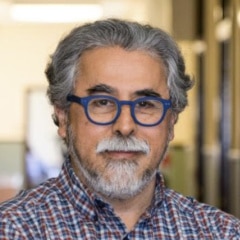
Major Disciplines: Bilingual Education, Education, Mathematics Education, Multicultural Education, Quantitative Research Methods, Science Education, STEM Education, English Learners
Areas of Research: Bilingual/Multilingual Learners, Equity and Diversity, Language, Latine Students, Multicultural Education and Diversity
Methods: Quantitative, Mixed Methods, Comparative, Psychometrics
William Tate IV, Louisiana State University (Executive Board Member)

William F. Tate serves as president of LSU. He holds faculty appointments in sociology (primary), psychiatry and behavioral medicine (clinical), epidemiology (secondary), and population and public health (secondary) at the Baton Rouge campus, LSU Health Sciences Center in Shreveport, LSU Health Sciences Center in New Orleans, and Pennington Biomedical Research Center respectively. As president, he provides overall leadership, vision and direction for all the LSU campuses across Louisiana. The LSU system is dedicated to providing a positive learning environment that enables students to achieve their full potential. It includes the LSU Agricultural and Mechanical College at Baton Rouge (the premier flagship university for the state); campus units at Alexandria, Eunice, and Shreveport; Health Science Centers in New Orleans and Shreveport; LSU Agricultural Center; and Pennington Biomedical Research Center in Baton Rouge.
Beth Warren, Boston University
Beth Warren is Sylvia Earl Professor and Director of the Earl Center for Learning & Innovation at Boston University Wheelock College of Education & Human Development. She is also Professor in the Department of Language and Literacy Education. Dr. Warren’s research imagines possibilities for learning and teaching beyond the settled forms of schooling that have failed too many of our children and youth, especially those from historically oppressed communities. Her research builds from the heterogeneity of human cultural practices to design educational ecologies that cultivate justice, dignity, and mutual flourishing. Working in partnership with teachers, youth, scientists, and artists, Dr. Warren and colleagues investigate questions at the intersection of culture, language, race, learning and teaching across STEM, humanities, and arts disciplines. They also explore designs for teacher learning that work at disrupting and transforming power in moment-to-moment classroom interaction in ways that sustain multiple values, purposes, and arcs of human learning. Prior to BU, Dr. Warren was Senior Scientist in the Education Department at BBN Laboratories and then co-Founder and co-Director of the Chèche Konnen Center (“search for knowledge” in Haitian Creole) at TERC, a not-for-profit educational research and development organization. She has collaboratively led numerous private foundation and government-funded projects that pursue design-based research to reimagine disciplinary learning and teaching by attending closely to their cultural, historical, political, and ethical dimensions.
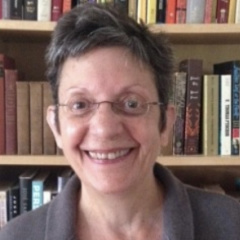
Major Disciplines: Bilingual Education, Learning Sciences, Pedagogy, Politics of Education, Qualitative Research Methods, Science Education, STEM Education, Teacher Education
Areas of Research: African-American Students, Bilingual/Multilingual Learners, Classroom Discourse, Equity and Diversity, Immigrants, Language, Learning, Literacy, Multicultural Education and Diversity, Teachers, Race, Teaching/Pedagogical Studies
Methods: Discourse Analysis, Ethnography, Design-Based Research
Jamaal Young, Texas A&M University

Major Disciplines: Education, Mathematics Education, Statistics/Measurement/Research Methods, STEM Education
Areas of Research: Achievement, Equity and Diversity, Multicultural Education and Diversity, Teachers, Teaching/Pedagogical Studies, Urban Students
Methods: Quantitative, Meta-analysis, and Literature Synthesis
William Zahner, San Diego State University
Bill Zahner is an associate professor in the mathematics department at San Diego State University and the Director of the Center for Research in Mathematics and Science Education. Zahner’s research focuses on developing classroom learning environments in which students from historically excluded and marginalized communities have greater opportunities to learn mathematics. Zahner is especially focused on developing classrooms in which multilingual students who are bureaucratically classified as English Learners can benefit from participating in classroom discussions. Zahner has been PI or co-PI on multiple funded research projects and his research has been published in venues such as Mathematical Thinking and Learning, Educational Studies in Mathematics, Teachers College Record, and Review of Educational Research. Zahner started his career as a secondary mathematics teacher in Chuuk, Federated States of Micronesia. He later taught in San Jose, California. In his current role in the mathematics department SDSU, Zahner teaches undergraduate mathematics courses as well as graduate courses in mathematics and science education research. Zahner also mentors doctoral students and postdoctoral researchers working on funded research project.


